60ish female, Aussie, loves Good Omens and Doctor Who, amongst others
Don't wanna be here? Send us removal request.
Text
Good Omens season 2
The Second Coming was actually S2
If you look at the opening titles for S2, you'll notice that, in the first and the last episodes of the season-- "The Arrival" and "Everyday"-- there is a word hidden within the theatre. It's on the wall on our right on the bottom floor concession stand as they move through the theatre. What's hidden there is the apparent name of the concession stand-- The Parousia.
Parousia is a Greek word meaning arrival and presence that is also used to refer to The Second Coming. In The Bible, it can also refer to the arrival of other prophets, though, too.
So, the first time we see this word in Good Omens? It's there in the episode entitled "The Arrival", in which the one to arrive was actually Gabriel, right? (And note the Jesus cross he was holding in the statue of him that we kept seeing all season...)
And stop me if any of this is a little familiar but... Gabriel was tired, sick, naked, and hungry, and what did Crowley and Aziraphale do? They protected him, helped him heal, fed him, gave him clothes, and a place to sleep... pretty Jesus-y...
Meanwhile, Gabriel's status was unknown all season by all the apostles around him, except for these closest ones who had been near his tomb...
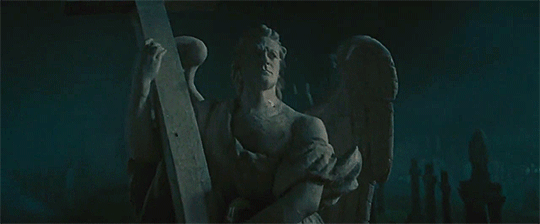
...and, in the end, he was risen.
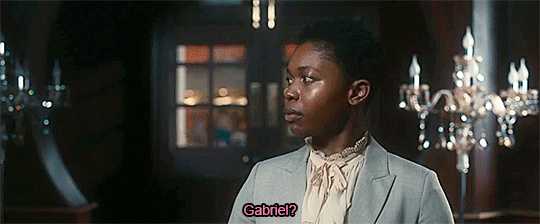
In the final group scene, Gabriel returned, everyone who couldn't see him at first then saw him there, and he judged them all accordingly by saying that Heaven and Hell were not up to scratch.
Parousia is from the Greek and also means presence. The concessions stands part of the theatre in the opening titles remains vacant all season. No one's eating or drinking anything in the story, either... or getting much of the thing for which food and drink is also symbolic in Good Omens. They are largely pushing away being present and abandoning the mindfulness that parousia also is, in addition to being a word referring to The Second Coming.
The other episode where we can see The Parousia on the wall again is the very last one of S2-- "Every Day."
The episode is not entitled "Everyday", like how the song title is worded. It is entitled "Every Day," as in... every bloody day. The only other place where it appears like this in the story in S2 is that, during the season, on one of the graves in the opening title sequence is "Every Day"... likely symbolic of how we face the impending arrival of death every day, of how we choose to live is up to us, of how worn down we can get by life sometimes, and of how that can push us into crisis. Our conflicts and struggles come back around and that's really what The Second Coming is. Like with our personal armageddons, we can stop them but they might come back around. We face the conflicts of parousia all the time.
All of S2, when you think about it, is Aziraphale and Crowley's stuff coming back around to haunt them again. It's the second coming of Good Omens itself-- a second season of the show-- and it's a second coming around of the same issues from S1. It's become time for a judgement call to be made on some things by Crowley and Aziraphale in their own lives together and that has prompted a second coming of their conflicts returning.
I don't think that we need Jesus in the rest of the story because we've already rolled back the tomb on a guy with a savior complex a mile wide. It's this kind and judgy bitch right here...
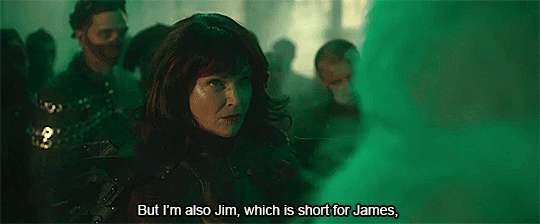
62 notes
·
View notes
Text
bro choose every possible cheat code 🐈😺
65K notes
·
View notes
Text
I’ll forever be grateful to Rob, Rhi, the Pratchett Estate & Narrativia for fighting for Good Omens.
It’s exceedingly clear that we, as fans, owe them A LOT. And we need to thank them. And we DON’T do that by acting as petulant children and not watching what they create. So don’t boycott, or whatever some people are calling for. Yes, polite calls for more time, budget, etc are great. Childish tantrums, no. It just ends up in your toys being taken away. Trust me.
I’ve found a lot of people’s assumptions regarding the finale’s plot interesting. Terry never witnessed the fan reaction to the series. Sure, there was shipping of Aziraphale & Crowley, but nothing like after it hit TV.
I doubt he would’ve really cared all that much, either.
His focus would be on the intricacies of the Armageddon 2.0 storyline for this finale. The zombies (dudes [gn], there’ll be undead everywhere), Jesus coming back, etc. We know he’d want to discuss the underlying nuances of the politics in Heaven & Hell and how they’re just two sides of the same coin. And isn’t it all of Them vs all of Us?
Of course our Ineffable Duo will be there. But don’t forget they weren’t actually the sole focus of Good Omens, the novel. The one Terry wrote 75% of.
I really hope we’ll get 1941 Pt 3, and a few other bits of historical context, but for the most part, that’ll be left to us to write in fanfiction.
GO The Finale will, in all likelihood, focus almost exclusively on the here & now.
I’d really recommend to anyone struggling to have a (re-re-re-x infinite)re-read of the novel, and other Pratchett works, particularly his Discworld novels. Small Gods and Pyramids are good ones for religion.
Anyway, enough from me. I’ll definitely be writing more in-universe fanfic, especially as it’s unlikely we’ll see any of the historical scenes I’ve been wanting to research. I’ve got a BIG work planned which I’m doubly committed to writing now.
144 notes
·
View notes
Text
Remember: you don’t have to choose.
You can be grateful that we are getting an on-screen, canon completion to Good Omens, AND devastated that the time we had anticipated getting to spend with our favorite idiots has been slashed by 75%.
You can acknowledge how close the series obviously came to being canned entirely and give a sigh of relief, AND weep for the storylines and flashbacks that will be chiseled away or cut entirely.
You can logically accept that a good movie can accomplish a hell of a lot in ninety minutes, and Good Omens will have a massive leg-up because all of the establishing elements are already there and they can basically jump right into the action, AND feel disappointment and sorrow — grief, honestly — for the loss of what we have been anticipating for so long.
Good and bad, light and shadow, joy and pain — they aren’t mutually exclusive. One does not cancel out the other. They can coexist…and sometimes they must. Don’t try to stamp out one side or the other, either in your own heart or in someone else.
Feel your big feelings. Give them space to breathe. Feelings are neutral; it’s what you do with them that counts.
So hang in there. We’re all in this together 💛
#good omens fandom#good omens finale#good omens#lots of big feelings floating around#let kindness be one of them
5K notes
·
View notes
Text
Awesome artwork
A Demon
It's not that bad when you get used to it.


@goodomensafterdark see? Sometimes I do remember to tag you!
8K notes
·
View notes
Text
Is Crowley already the new Supreme Archangel?
A few oversights made millennia ago, and suddenly we have a demon archangel on our hands.
Caution: I came up with and wrote this in the last few hours so potentially crackpot theory ahead. Apologies if this has been proposed before, it’s not one I’ve seen. And I’ve seen A LOT.

So supposedly the miracle Aziraphale and Crowley performed together was something only the mightiest of archangels could have done. Everyone assumes it was Crowley because they think he was a high ranking Angel formerly. Or that it was the two of them together. Or that Jimbriel amplified it. But what if…
“There is always a supreme archangel”
Michael says this in S2E1 when talking with Uriel about who is in charge now that Gabriel was missing. Gabriel was removed from office in the trial we hear, he’s no longer Supreme Archangel. If so, Michael’s statement would imply that as soon as Gabriel’s removal happened, a new archangel already existed. Now obviously the Metatron is making a show of choosing Aziraphale as the new Supreme Archangel. But is that within his power to do so? Or is he suggesting working with Crowley for a different reason, possibly unknown even to him?
“I am the only first-order archangel in the room, or you know, the universe”
During the “2nd Armageddon-that-wasn’t” discussion, Gabriel says these words. As he says them, it cuts (ominously isn’t the right word here, pointedly maybe?) to Crowley leaning against the desk, and lingers there just a bit too long.
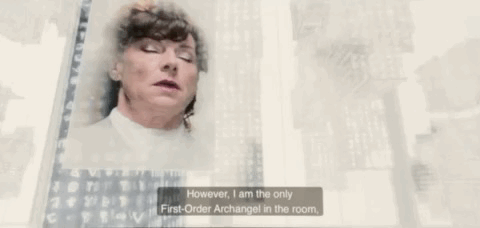
“How do you know it wasn’t me?”
Another clue to the powerful angel Crowley was. It was clearly said in a teasing manner throw Shax off. But much like the barrel of red herring in the intro, is it a red herring to something else?
“Can you send lightning bolts and get them to report back to you?”
The only other time we see someone calling lightning or using it is, you guessed it: Gabriel in S1 on the airbase to port in and out. I’ve read the theory that Angel!Crowley was the lord of lightning, which I’m not opposed to, but to me this is another link.
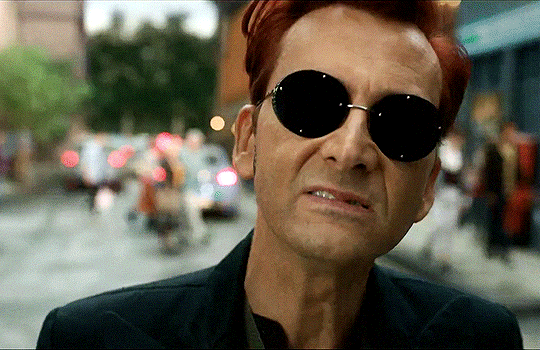

“Never change their passwords”
We have one HUGE instance of Heaven being sloppy in their record keeping (passwords), and lax in their security protocol (Crowley bopping about with Muriel). Whereas Hell is meticulous in their record keeping, as shown by the bills, admissions process, and S1 contract.
So what if: when Gabriel was stripped of the title, a new Supreme Archangel was automatically appointed. Except instead of someone else, because heaven neglected to double-check their logs after The Fall, Crowley was still on the books as next in line? This would absolutely play into “God playing games with the universe” and “just think what would have happened if we’d been at all competent” themes running through both seasons. It would also follow the theory that people noticed Aziraphale and Crowley were on the “wrong” side for much of the season. It would also explain a few continuity errors along the way (how did Crowley know Muriel’s rank? He knows it through the knowledge automatically given to the Supreme Archangel).
“Funny ol’ world, isn’t it?”
Caveats and potential weaknesses:
I have no idea how this fits into the fact that S3 will be the actual continuation the Neil and Terry planned, as to my knowledge S2 was essentially a “Neil’s chaotic angsty ineffable husbands fanfic”. But clearly S2 has to play well into the plan for S3. I also kind of hate my theory because Crowley specifically declined to be an angel again, and his hand has been forced too often already.
Now I am a staunch advocate of the body-swap theory, and I’m not sure how this would play into that. Does Metatron know? Does he think he has the power to appoint? Does he think the title went to Aziraphale because of the miracle? Does he try to get Crowley to come back with Aziraphale to exploit his power? Does he know about the body swap in S1 and if so, was he trying to trigger another one to get the right “soul” to heaven?
There are a few other things I haven’t figured out how to incorporate into this post yet. I’ll try to put them into coherent thoughts in the next few days, but thought I’d throw this to the wolves universe for the time being.
Thought 1: “How have your lot managed to stay in charge all this time?” “I’m not so sure we have.”
Thought 2: I need to do (another) rewatch before I nail this one down (such a sacrifice I tell you), but does Crowley have a visceral reaction like he does in S1 to being called “good” in the current, post Gabriel-removal timeset? Obv in Edinburgh/Job, but that’s in the past. He denies it, sure (with Jim), but he straight up flashes a smile and thanks Mrs. Sandwich when she says “You’re a good lad” (after the denial).
2.1: No one calls him “good” in present day except these two instances. Vast difference in the visceral reactions of season 1 and flashbacks.
Thought 3: Crowley is the only one who can trigger Jimbriel’s recall memory.
279 notes
·
View notes
Text
Good Omens filming locations masterpost! ❤ 🐍😊 Part 2
(here to part 1 :))
Here to the map :)
Others in England (cont):
Tadfield Manor (S01E01, S01E02) - Bulstrode, Gerrards Cross
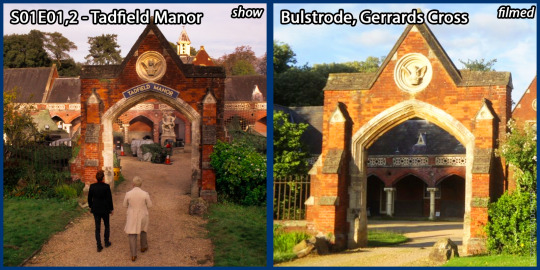
Scene: The Tadfield Manor where the satanic nuns run the hospital in the first episode and Aziraphale and Crowley visit in the second episode
Availability (as of 2024): The manor has been in private hands since 2016 - in 2023 sold again, I didn't find on the internet that it would be available to visit in any form, the manor is not visitble from the public road.
Link on the map
Four Horsemen meeting (S01E05) – Old School Cafe, Longcross Road B386
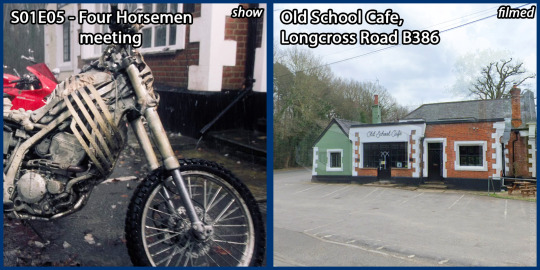
Scene: The cafe where Four Horsemen meet
Availability (as of 2024): street all day, the cafe Mon-Fri 7:30-15:00, Sat-Sun 8:30-15:00
Link on the map
Heaven middle floors (S01E01, S01E03, S01E04, S01E05) - Weybridge Business Park, Addlestone

Scene: The Heaven middle floors scenes in season 1 were filmed here
Availability (as of 2024): The places can be sort of seen from the street but I don't think that visiting is possible
Link on the map
Pollution by the river (S01E04) – River Wey Navigation, Guildford

Scene: The International Express Man delivers the package to Pollution
(fun fact: this one was the harderst one to pin down the exact location, I only knew bc of an article that the schooting took place by "Wey Navigation" which is a river long 32km (miles), I tried to find a better mention or through google maps comparing place for a long time but couldn't, finally I wrote to the River Way Navigation organization on facebook but they had no record of the shooting. Finally, in one of the photos I noticed that in the background there is a footbridge that I saw a photo of a similar footbridge while searching on a history of Wey Navigation river on the UK National Trust page and fortunately the previous mentioned facebook page knew where it was, WAHOO! :))
Availability (as of 2024): all day
Link on the map
Hogback Wood (S01E01, S01E02, S01E04, S01E05) - Painshill Park, Cobham
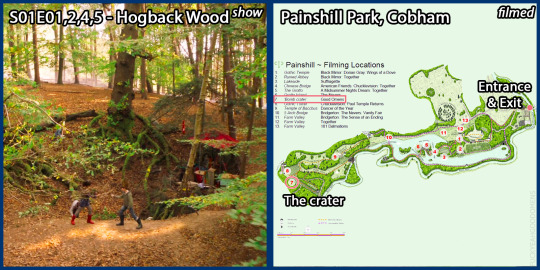
Scene: The Hogback Wood where The Them play, seen in several episodes.
Availability (as of 2024): The entrance to the park is paid (£11 with prebooking online on https://painshill.co.uk/visit-us/ticket-prices-booking/) They open at 10 and close at 16-18 depending on the season. The World Word II crater they shot the main scene at should be in the west-south tip of the park. The whole path there and back is 4km (2,5 miles).
Link on the map
International Express Man's house (S01E04) - Shetland Close, Guildford

Scene: The International Express Man leaves the house to make deliveries
Availability (as of 2024): street all day
Link on the map
Agnes Nutter's village (S01E02) - Weald & Downland Living Museum, Chichester
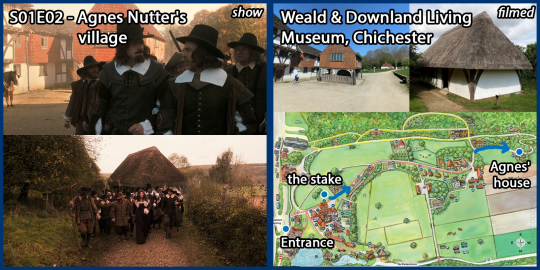
Scene: The Agnes Nutter's village in episode two. In the map I highlighted which part we see the villagers and Witchfinder Major Pulsifer to through in the show.
Availability (as of 2024): The entrance fee is paid (£15.50 for an adult ticket prebooked online https://www.wealddown.co.uk/), it opens at 10 and closes at 16-17 depending on the month.
Link on the map
Tadfield Air Base (S01E05, S01E06) - RAF Upper Heyford, Bicester
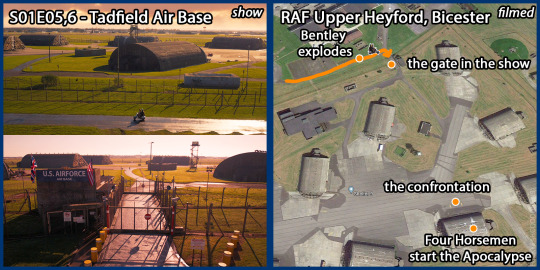
Scene: For the shooting of the Tadfield Air Base the former RAF Upper Heyford was used, by the examining the google maps and screenshots from the series I think that the area labeled as 'Shelter 9' was used.
Availability (as of 2024): The place is no longer used by RAF purposes, there are several companies that use certain areas it but it is not available for public. The Upper Heyford Heritage though organizes (paid - £25.00) tours through the airbase: http://www.upperheyfordheritage.co.uk/home-page/tour-booking/
Link on the map
Soho (S1) – Bovingdon Airfield Studios
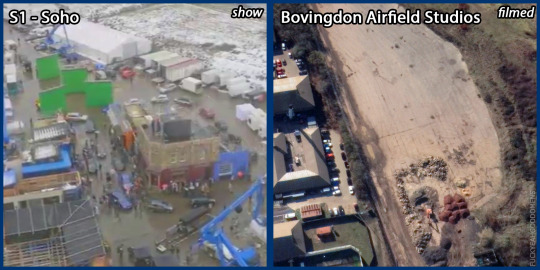
Scene: The Aziraphale's bookshop and Soho in season one were built at Bovingdon Airfield Studios
Availability (as of 2024): The studios can be rented but I don't think they are publicly available – the Soho is not there anymore though, it is now build in studios in Scotland.
Link on the map
The motorway on fire (S01E05) - M96 Training Motorway at Fire Service College, Moreton-in-Marsh
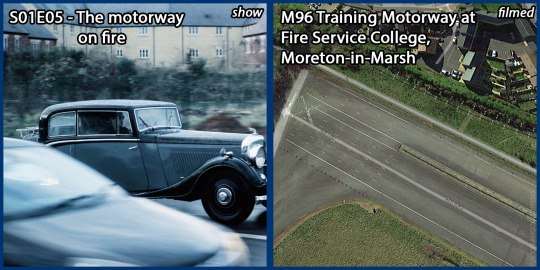
Scene: The motorway on fire when Crowley is heading for Tadfield was filmed at M95 Training Motorway at Fire Service College that is usually used for training emergency service professionals
Availability (as of 2024): Not publicly available.
Link on the map
South Africa:
The 1941 church (S01E03) - St. Saviour's Church, Claremont, Cape Town
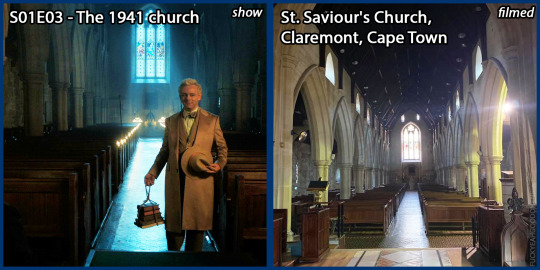
Scene: The scene in Season 1 where Aziraphale is outsmarted by the Nazis and is saved by Crowley
Availability (as of 2024): Their facebook says Always open
Link on the map
Famine at a fancy restaurant (S01E03) - Mutual Heights building, Cape Town
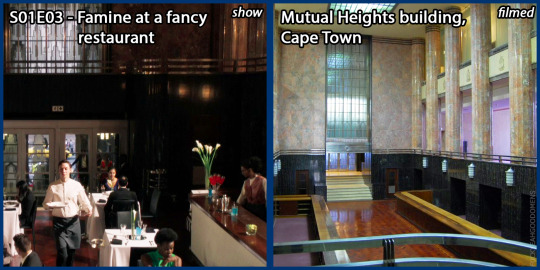
Scene: The restaurant where we meet Famine for the first time
Availability (as of 2024): It is a building with flats, offices and a reception, not available to public.
Link on the map
Crowley in a cinema (S01E04) - Joseph Stone Auditorium, Cape Town
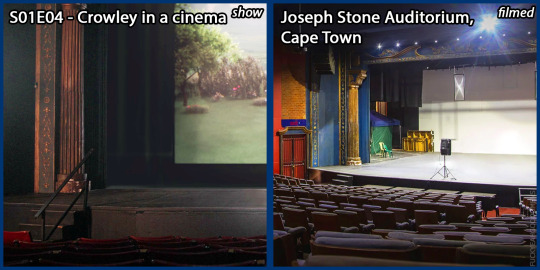
Scene: Crowley in a cinema (with Neil Gaiman cameo) watching animated rabbits when Hastur interrupts
Availability (as of 2024): Not publicly available as such but they there are presentations and and such happening there https://www.facebook.com/josephstone1968/
Link on the map
Aziraphale dancing gavotte (S01E04) - Casa Labia, Cape Town
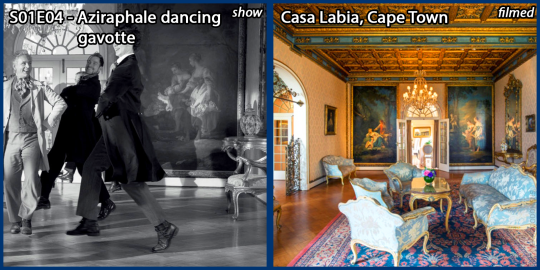
Scene: Aziraphale dancing gavotte in a discreet gentlemen's club in Portland Place in the late 1880s was filmed at Casa Labia in Cape Town
Availability (as of 2024): Casa labia is hotel and a restaurant so it can be visited in that way https://www.casalabia.com/
Link on the map
Anathema's child home (S01E02) - Llandudno Rock Villa, Cape Town

Scene: The home which we see Anathema as a child with The Book (in the show it's Malibu, California)
Availability (as of 2024): street all day, the villa itself seems that it can be rented
Link on the map
Eden desert and ep6 time bubble desert (S01E01,S01E06) – Atlantis Dunes, Cape Town

Scene: The Eden desert scenes and the time bubble with Adam and AC were filmed in the Atlantis Dunes at the outskirts of Cape Town
Availability (as of 2024): The Atlantis Dunes – or Witzands Aquifer Conservation Area – is a protected natural area. Biking adventures can be booked through https://atlantisdunes.com/ or also other activities through https://www.capetown.gov.za/Family%20and%20home/see-all-city-facilities/our-recreational-facilities/Nature%20reserves/Witzands%20Aquifer%20Nature%20Reserve
Link on the map
The apple tree in the Garden of Eden (S01E01) - Waterfall Valley (formerly Cascade Country Manor), Paarl

Scene: The Eden apple tree with the waterfall in the background was filmed at the retreat Waterfall Valley (then Cascade Country Manor) (the tree was added by the film crew for the scene)
Availability (as of 2024): I am not sure if you can visit the waterfall like that or you have to be a guest in the restreat. The retreat is available for booking: https://www.waterfallvalley.online/
Link on the map
There were other scenes also filmed at South Africa (thought not specified exactly where): Hell was filmed in Cape Town in a former abattoir. The Noah’s Ark scene and the Crucifixion scene were filmed on a windswept plain just outside Cape Town. Also the Meggido scenes. The entire village used for the scene with War causing mayhem in an african village is in fact a set, built on scrubland over a sand mine just outside Cape Town. The French Revolution scene wa shot on a set that had been used twenty-four hours earlier for the scene in Ancient Rome. Famine visiting a burger place with Elvis was shot on a set in Cape Town. Also some scene's in Anathema's cottage with Anathema and Newt.
SEASON 2
Most of season 2 has been shot inside the film studio in Bathgate (f.e. the whole Soho has been built there), the Hell in S2 has been shot in an old disused factory (not specififed which one). The shots of the Edinburgh castle have been shot from the top of the The Caledonian hotel.
Edinburgh:
Crowley and Shax in St James's Park (S02E01) – Inverleith Park, Edinburgh
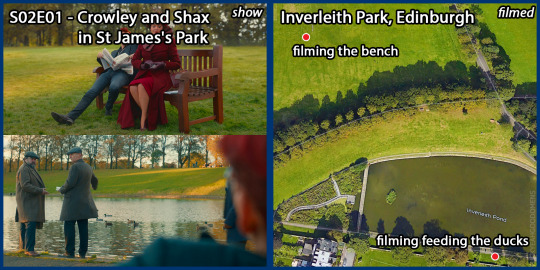
Scene: Crowley and Shax meet to discuss the news in St James's Park – the scene though was actually filmed in Scotland.
Availability (as of 2024): All day
Link on the map
The place where Crowley parks the Bentley (S02E01, S02E02) – Circus Lane, Edinburgh
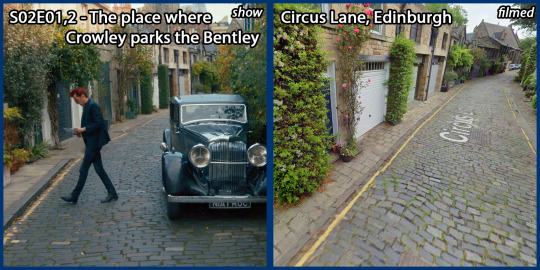
Scene: The place Crowley goes to to park the Bentley and sleep there
Availability (as of 2024): street all day
Link on the map
AC and Elspeth in Edinburgh (S02E03) - Moray Place, Edinburgh
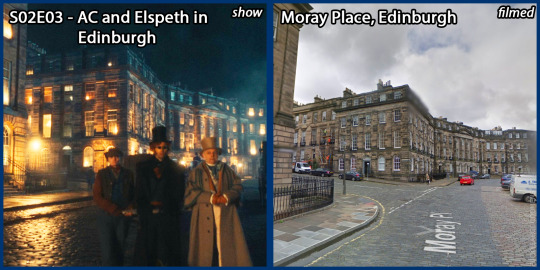
Scene: Aziraphale, Crowley and Elspeth are taking the first "pickled herring" to be sold, Aziraphale and Crowley are debating good and evil
Availability (as of 2024): street all day
Link on the map
Detective Aziraphale parks the Bentley (S02E03) – Victoria Street, Edinburgh
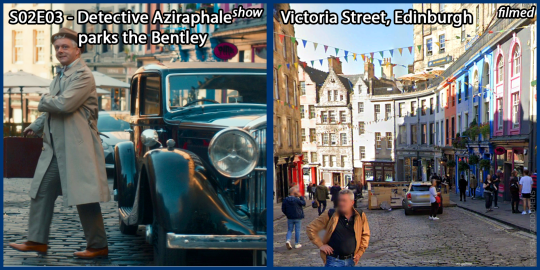
Scene: Aziraphale arrives in the Bentley and happily goes to investigate
Availability (as of 2024): street all day
Link on the map
The Resurrectionist (S02E03, S02E06) - Cask and Barrel, Edinburgh
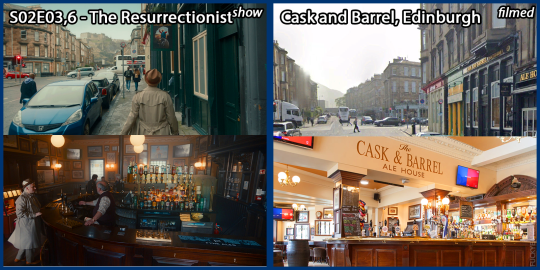
Scene: Aziraphale goes to investigate to The Resurrectionist bar (also in Gabriel's memories with Beelzebub) – filmed in the Cask and Barrel bar
Availability (as of 2024): outside all day, inside 12-24, Fri-Sat 12-1
Link on the map
Stirling:
Edinburgh cementery (S02E03) - Old Town Cemetery, Stirling
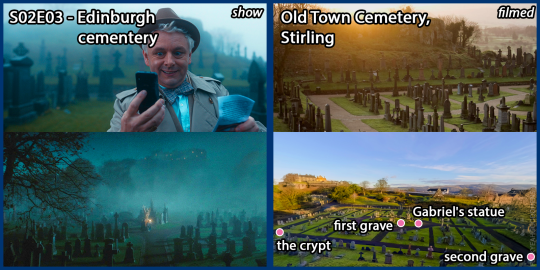
Scene: The cemetery in episode 3 was filmed at the Stirling cemetery (grave, some gravestones, Gabriel's statue and the crypt has been added by the crew for the shooting)
Availability (as of 2024): all day
Link on the map
AC and Elspeth going through Edinburgh (S02E03) – Broad Street, Stirling
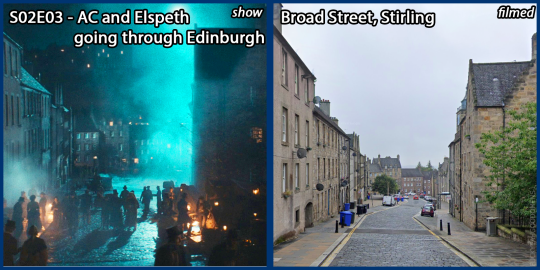
Scene: Aziraphale, Crowley and Elspeth going through Edinburgh while Aziraphale is trying to persuade her that she could do something else
Availability (as of 2024): street all day
Link on the map
Meeting Wee Morag (S02E03) - Mar's Wark, Stirling
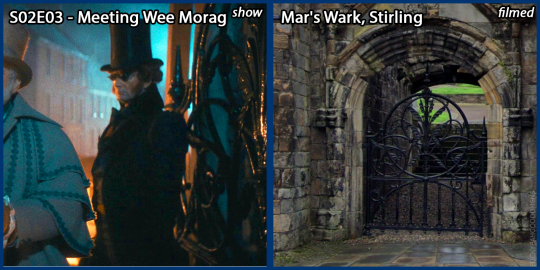
Scene: The small corridor behind the gate where Wee Morag is staying
Availability (as of 2024): The front all day, the corridor if not through the gate then hopefully from the other side
Link on the map
Others in Scotland:
AC drinking whiskey with Mr Darlymple and the corridor to Mr Darlymple (S02E03) – Hopetoun House, Queensferry
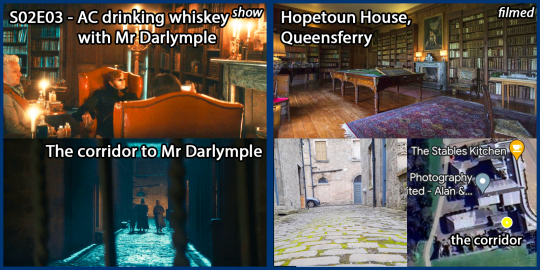
Scene: Aziraphale and Crowley drinking whisky with Mr Darlymple while he explains why he needs fresh dead bodies also at the house has been filmed the corridor reading to Mr Darlymple
Availability (as of 2024): Hopetoun is visitable, Friday 29 March 2024 to Sunday 29 September 2024 Open 5 days per week (Thursday – Monday) from 11am to 5pm, £13.50 for an adult ticket for House and Grounds (to see both), or £13.50 for Grounds (to see the corridor)
Link on the map
The Windmill Theatre in 1941 (S02E04) - Hippodrome Cinema, Bo'ness
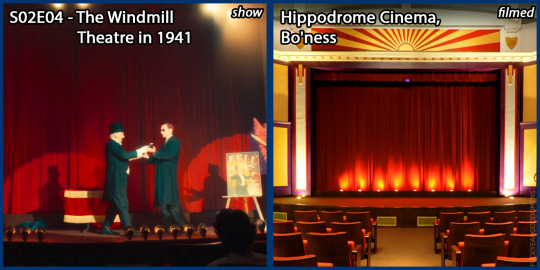
Scene: The theatre that Crowley delivered the broken alcohol to and Aziraphale performed the bullet catch
Availability (as of 2024): You can visit the cinema for a movie or an event https://www.hippodromecinema.co.uk/whats-on/
Link on the map
Soho and more (S2) - The Pyramids Studio, Bathgate
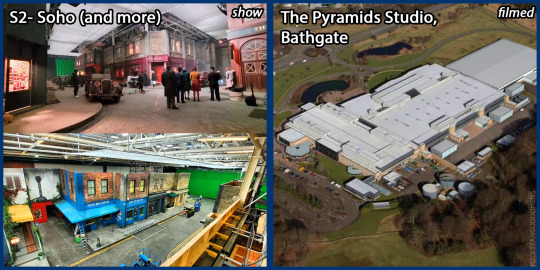
Scene: The S2 Soho has been built in the Bathgate studio, also there were built and shot many other scenes
Availability (as of 2024): It is not available to visit for public
Link on the map
London:
Possibly only streets were filmed and the Bentley was added with VFX.
C on the way to A after A calls him (S02E01) - Wardour Street, London
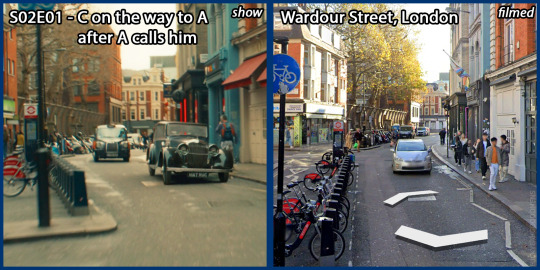
Scene: Crowley on the way to Aziraphale after Aziraphale calls him (to tell him about Gabriel)
Availability (as of 2024): street all day
Link on the map
C rushing to A after Beelzebub's visit (S02E01) - Regent Street St James's, London
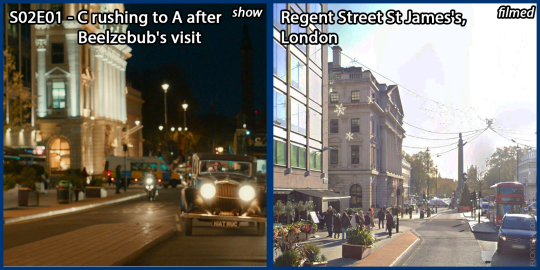
Scene: Crowley rushing to Aziraphale after Beelzebub told with that anyone who will be find helping Gabriel will be dealt with extreme sanctions
Availability (as of 2024): street all day
Link on the map
Whew! This masterpost took me several weeks, hope you enjoyed it and it might help you plan your trip to see the Good Omens places! :) ❤ 🐍😊 Wahoo! :)
1K notes
·
View notes
Text
Good Omens filming locations masterpost! ❤ 🐍😊 Part 1
I made a Google map containing all the locations, see here! :)
Part one contains Season One, continue here for part 2 containing the rest of S1 and Season Two!!! (it is split into more parts because tumblr has a limit of images in one post :))
SEASON 1
London:
AC in Berkeley Square (S01E06) - Tavistock Square, London

Scene: AC swap back and decision to go to The Ritz
Availability (as of 2024): 7:30–21
Link on the map
Crowley in the pub (S01E05) – The Enterprise pub, London
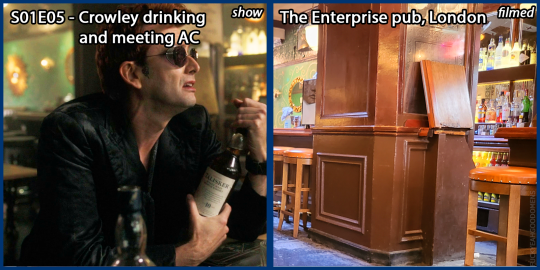
Scene: Crowley drinking and meeting not quite corporal Aziraphale
Availability (as of 2024): Mon-Wed 12-23, Wed-Sat 12-24, Sun closed
Link on the map
Crowley on the way to the burning bookshop (S01E05) – Wardour Street, London

Scene: Crowley's Bentley rushing throught the streets of London
Availability (as of 2024): street all day
Link on the map
AC on the bus (S01E01) - Piccadilly Circus, London

Scene: Aziraphale and Crowley meet on the bus to discuss the antichrist, in the background the Piccadily Circus can be seen
Availability (as of 2024): street all day
Link on the map
AC at The Ritz (S01E01, S01E06) - Criterion, London
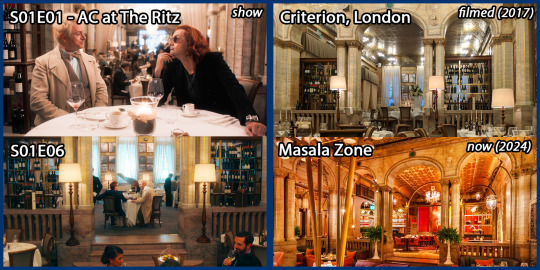
Scene: Aziraphale and Crowley at The Ritz in the first and sixth episode of the first season. It was actually filmed at the Criterion restaurant which since then has unfortunately been closed and now (2024) there is Masala Zone with unfortunately changed interier :(.
Availability (as of 2024): Mon to Thur 12:00-22:30, Fri 12:00-23:00, Sat 12:30-23:00, Sun 12:30-22:30
Link on the map
AC on the way to the manor (S01E02) – Whitehall street, London
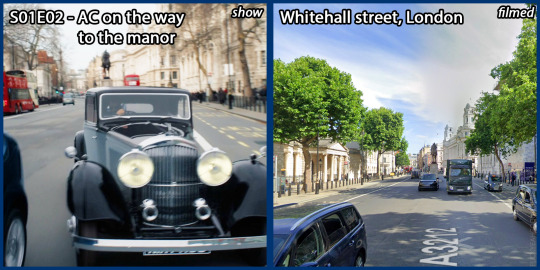
Scene: Crowley with Aziraphale driving the Bentley to the Tadfield manor
Availability (as of 2024): street all day
Link on the map
AC leaving the St James's Park (S01E01) - Carlton House Terrace, London

Scene: The stars on which Aziraphale and Crowley leave St James's Park in Episode 1, Crowley tempts Aziraphale to lunch and they speed away
Availability (as of 2024): street all day
Link on the map
AC meeting in St James's Park (S01E01, S01E03, S01E06) - St James's Park, London
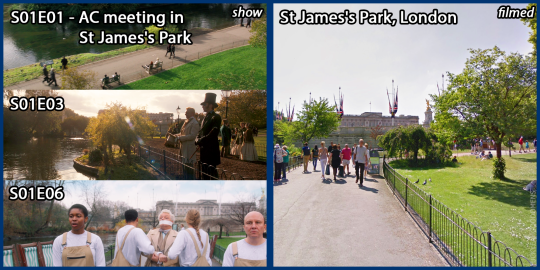
Scene: Aziraphale and Crowley's meeting in St James's Park by the ducks in the first season in episode one (about the antichrist), episode three (victorian scene) and episode six (the kidnapping)
Availability (as of 2024): 5-24
Link on the map
Newt meeting Shadwell (S01E02) – Between Westminster Abbey and Palace of Westminster, London
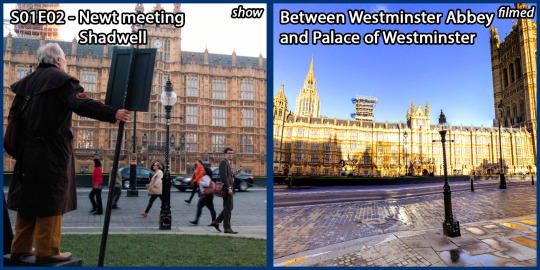
Scene: Newt meets Shadwell for the first time
Availability (as of 2024): street all day
Link on the map
The Bandstand scene in St James's Park (S01E03) – Battersea Park, London

Scene: The bandstand scene in season one.
Availability (as of 2024): 8am until dusk
Link on the map
Aziraphale stops Gabriel during his jogging (S01E04) - Battersea Park, London
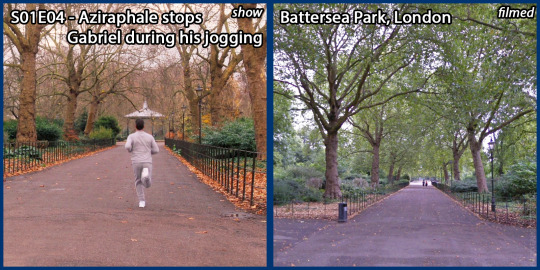
Scene: Aziraphale stops Gabriel during the jogging.
Availability (as of 2024): 8am until dusk
Link on the map
'Crowley' outside his flat (S01E06) - Eastfields Avenue, London

Scene: The morning after the Apocaflop 'Crowley' coming out from his flat.
Availability (as of 2024): street all day
Link on the map
Dirty Donkey in 1967 (S01E03) - The Cat's Back pub, London

Scene: The interior of Dirty Donkey from 1967 where Crowley meets Shadwell for the first time has been filmed in The Cat's Back pub (the interior has been transformed into the 60s)
Availability (as of 2024): Mon - Closed, Tues: 5pm - 11pm, Wed - Thu: 4pm - 12am, Fri: 4pm - 1am, Sat: 2pm - 1am, Sun: 1pm - 11pm
Link on the map
Shadwell reports to Crowley (S01E03) – Best Cafe, London
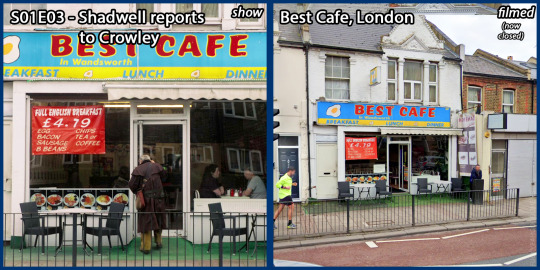
Scene: Shadwell meeting Crowley in the present time.
Availability (as of 2024): street all day, the establishment itself seems closed now :(
Link on the map
AC talking about the Warlock's birthday party (S01E01) - Crystal Palace Park, London
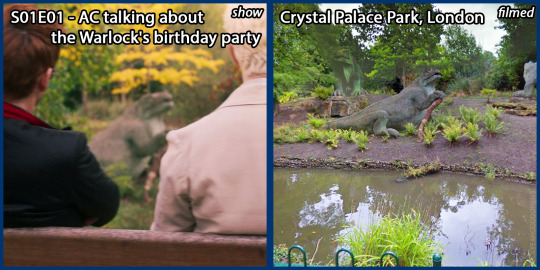
Scene: Aziraphale and Crowley watching Warlock in the park with dinosaurs and talking about the birthday party
Availability (as of 2024): 7:30am - sunset
Link on the map
AC stopping in a cafe after the manor (S01E02) – Penge Cafe (then) / Antonella's Cafe and Bistro (now), London
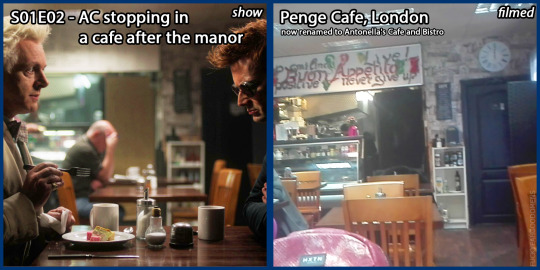
Scene: Aziraphale and Crowley stopping to discuss how to find the antichrist after visiting the Tadfield manor, at the time of the shooting it was named Penge Cafe, now renamed to Antonella's Cafe and Bistro
Availability (as of 2024): Wed-Sat 8:30-5, Sun: 9-5
Link on the map
AC watching Hamlet in 1601 (S01E03) – Shakespeare's Globe, London
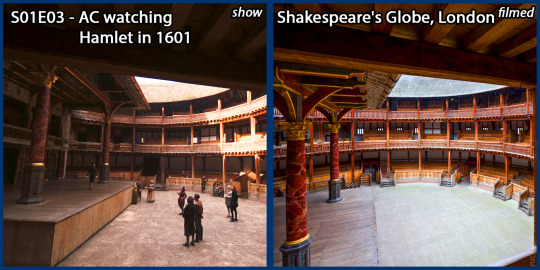
Scene: Aziraphale and Crowley secret meeting in 1601 during a Hamlet performance
Availability (as of 2024): They open at specific times for tours and performances. See performances and tours on www.shakespearesglobe.com/whats-on/, for example 3 APRIL - 23 OCTOBER there's a 'Pride Guided Tour bringing to life the queer stories and characters from Shakespeare’s life and times.' :). https://www.shakespearesglobe.com/whats-on/guided-tour-pride/
Link on the map
Crowley after bringing down the phone network (deleted scene, DVD) – Trinity Church Square, London
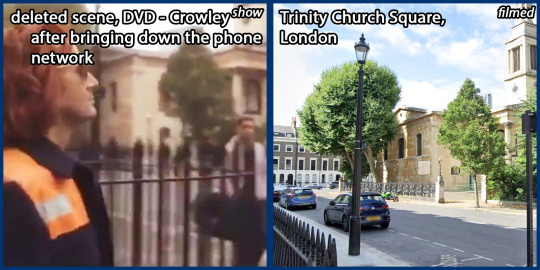
Scene: Crowley leaving after he brings down the mobile phone network in the BT Tower
Availability (as of 2024): street all day
Link on the map
Heaven top floor (S01E04, S01E06) – Sky Garden, London

Scene: The Heaven top floor background windows were filmed in Sky Garden, we are seeing this at the scene where Michael shows Gabriel the Earth Observation Files and during Aziraphale's execution (though the scene itself seems to be filmed with green screen)
Availability (as of 2024): the access is free but needs to be booked beforehand at https://skygarden.london/
Link on the map
Stairs To Heaven and Hell (S01E01) – The Broadgate Tower, London
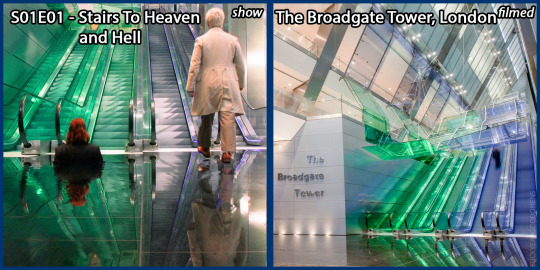
Scene: Aziraphale and Crowley go to Heaven and Hell through the staircase
Availability (as of 2024): The tower is open Mon-Fri 9-18 but there is a reception downstairs where these stairs are – I've visited twice and once they were okay with me taking picks of the stairs and once not. The stairs are thought well visible from the outside and pics can be taken that way.
Link on the map
Aziraphale, Tracy and Shadwell on a scooter (S01E05) - Cardwell Road, London

Scene: Aziraphale miracles Tracy's scooter to fly with them and Shadwell to Tadfield
Availability (as of 2024): street all day
Link on the map
Where Shadwell and Madame Tracy live (S01E02, S01E04, S01E05) - Hornsey Road, London
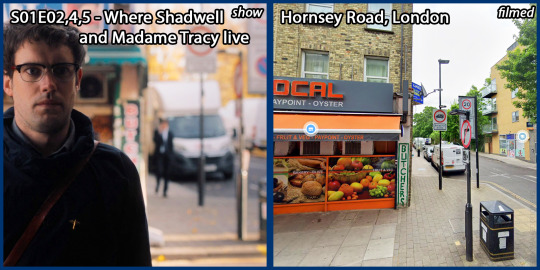
Scene: The residence of Shadwell and Madame Tracy. We see it in episode two (Newt arrives), episode four (Newt leaves for Tadfield) and episode five (shaken Shadwell arrives, customers for the seance arrive)
Availability (as of 2024): street all day
Link on the map
Aziraphale eating sushi (S01E01) - Red 'N' Hot (closed), London
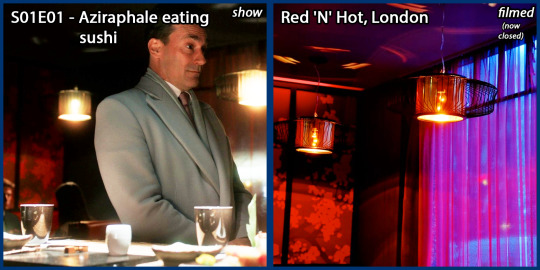
Scene: Aziraphale eating sushi with a surprise visit from Gabriel
Availability (as of 2024): It was filmed in the Red 'N' Hot – a sichuan restaurant, but it has been closed (now there is another restaurant with different interior)
Link on the map
Some scenes has also been filmed in the West London Film Studios.
Hambleden:
Hambleden is the place where most of the Tadfield village was shot :).
Tadfield Square (S01E01, S01E03, S01E05, S01E06) – Square in front of the church, Hambleden

Scene: Crowley phoning Aziraphale to tell him about the Armageddon in episode one, Adam reading and Anathema with R.P. Tyler in episode 3, seen R.P. Tyler meeting those going to the airfield in episode 5 and Aziraphale and Crowley are drinking on a bench after the Apocaflop and waiting for the bus
Availability (as of 2024): street all day
Link on the map
Adam's house (S01E02 , S01E03, S01E06) - Hambleden
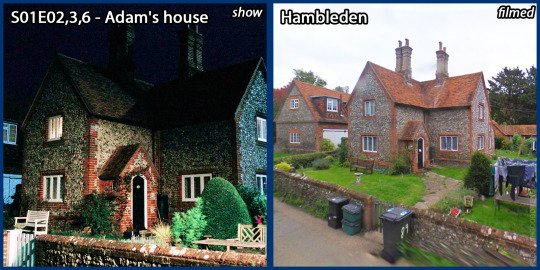
Scene: Adam Young's house (can be seen in several episodes)
Availability (as of 2024): street all day
Link on the map
The Them buying ice-cream (S01E02) – Hambleden convenience store, Hambleden
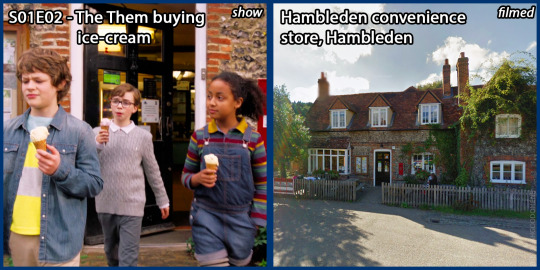
Scene: The store that The Them bough ice-cream from
Availability (as of 2024): Street all day, the store Mon-Sat 8-17, Sun 8-16:30
Link on the map
The Them planning to stop Armageddon (S01E05) - Hambleden
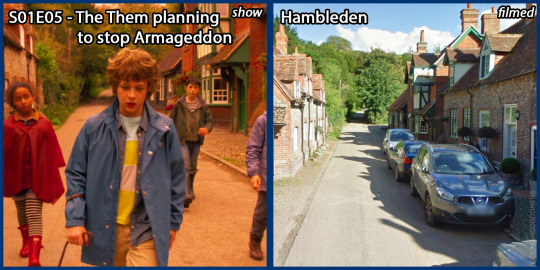
Scene: The Them returning planning to go to airfield and stop Armaggedon
Availability (as of 2024): street all day
Link on the map
Anathema's cottage (S01E02, S01E03, S01E04) – cca 2km from the Hambledon square

Scene: The scenes with Anathema's cottage (Jasmine Cottage) were filmed here, it can be seen several times throughout the series (like Anathema moving in, AC dropping her off or Adam visiting her)
Availability (as of 2024): street all day
Link on the map
Others in England:
Warlock's house (S01E01) – High Canons, Borehamwood
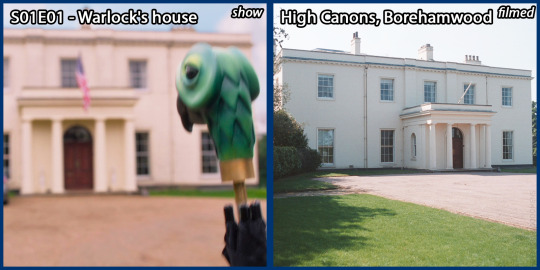
Scene: The Warlock's home was filmed at the High Canons Estate which is listed on National Heritage List for England
Availability (as of 2024): The High Canons Estate is currently privately owned and not open to public, the house is not visible from road.
Link on the map
Hastur and Ligur hand over the Antichrist (S01E01) – Holy Trinity Church, Penn Street
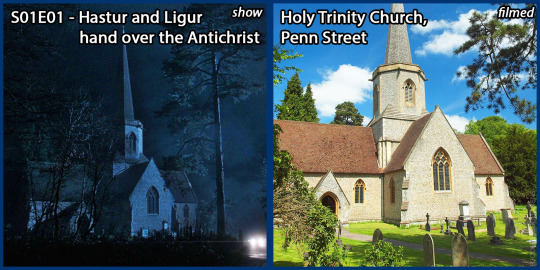
Scene: Hastur and Ligur give Crowley the Antichrist at the graveyard
Availability (as of 2024): the outside should be available all day
Link on the map
(continue to Part 2 :))
2K notes
·
View notes
Text
I hope we all realise just how special this time between Good Omens season 2 and season 3 is. We are all here together, creating fanfics, suggesting theories both big and small, spotting “Clues”, and supporting each other through it all. I am looking forward to season 3 immensely, but am enjoying this gap in the story - watching all the creative minds produce stunning artwork and stories, and the detectives brilliantly breaking down every morsel of what we have already seen. It is a wonderful time to be in this fandom. It is such an unique story, written and created by very talented authors, and performed by some of the best actors of our time, who are perfect for the roles. It will probably never come again, so enjoy it whilst it lasts!
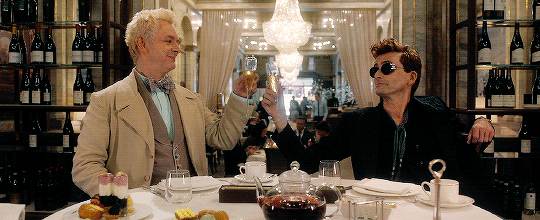
A year on, and these sentiments still apply.
2K notes
·
View notes
Text
S1E6 – The Very Last Day of the Rest of Their Lives P1 - up to the dissolution of the Horsemen
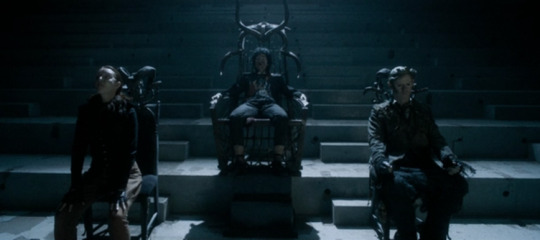
Well can you believe it? The last episode of the first season! And the first thing I want to make a note of is… the episode title. I really struggle to make sense of it because, linguistically, the only way something can be the very last of the rest of anything, is if it’s the very last of the thing at all. I can sort of make this idea make sense if I look at it from the perspective of the end of episode 5, where Armageddon is starting, and it does very much look like the world is about to end on that particular day, but it feels pretty woolly to me. Neil has been asked about this particular episode title before, but his answer did not help me wrap my head around the concept. In fact, it just made things worse:
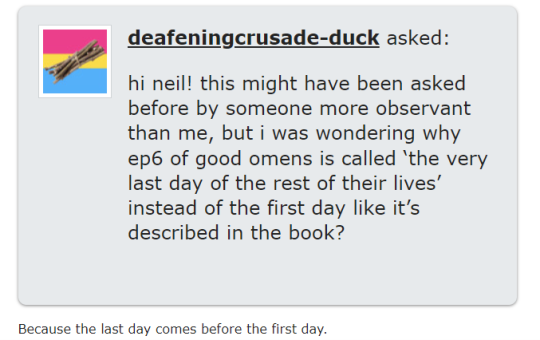
Nope. No, I’m sorry, but that makes literally no sense. Anyway, I don’t want to get hung up on the little details... Hey, didja notice how Crowley (aka Aziraphale) greets his trial panel in exactly the same way as he greets Hastur and Ligur in the graveyard?
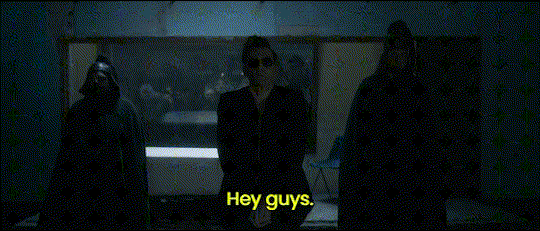
And that throw away line about getting some houseplants is pretty telling when you remember that it’s actually Aziraphale delivering that line (oh, spoiler alert there I guess, but I would have thought that anybody reading this far into the labyrinth of my brain wanderings is probably going to have seen this show at least once before). It shows that Aziraphale knows exactly what the inside of Crowley’s flat contains, and that the only thing he would care about enough to actually furnish a space is houseplants. One thing I do question though, is how Aziraphale would know who Hastur and Dagon are. He definitely would have known who Beelzebub is, saw her on the tarmac at the airbase in fact, but those two? I don’t know when he would have come into contact with them before, particularly in their demon forms. Crowley could have given him a description of as many of the named demons as possible I suppose, but it’s a bit thin as a theory goes. But more curious is presence of the montage at this point in the episode.
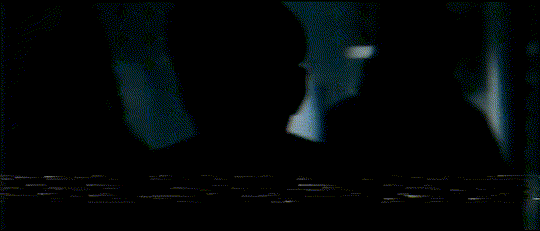
It’s just short of 7 seconds long, and takes place less than 2 minutes into the episode. It also happens to contain the entire storyline for the episode in reverse. Shots of Aziraphale (Crowley really) tied up in Heaven, Aziraphale and Crowley in the park together, the Bentley and book shop in their respective restored state, Adam with Aziraphale and Crowley complete with wings, Satan breaking through the tarmac – it’s all there. It even comes complete with those fuzzy little lines that you used to see when you were rewinding a video back in the days of VHS (yes, I do actually remember that) to show that we’re watching events in reverse. It’s not like we haven’t seen montages used to represent the passing of time in this show before, but this is the first time it’s been done with parts of the story that we, the audience, haven’t yet seen. It goes by pretty fast so it’s not like you’d be able to work out the plot by watching it in real time, but I think it’s a risky play nonetheless.
Next curious thing in this episode. The music playing from Crowley’s Bentley as he approaches the gates of the airbase is different to what we heard in the previous episode. It’s the same song, but it’s a different section. Not only that, but the music continues playing from inside the car after he closes the door, whereas in the previous episode the slamming of the door cuts the stream of music off abruptly. There is nothing else different about this rendition of the scene from the one at the end of the previous episode as far as I can see but it’s a subtle difference that I find interesting, especially when you consider how many of the beings involved in the events leading up to Armageddon come to have somewhat blurry memories of what happened.
I have to say, the depth of Crowley’s grief at the loss of the Bentley came as something as a surprise to me when I first watched this show.
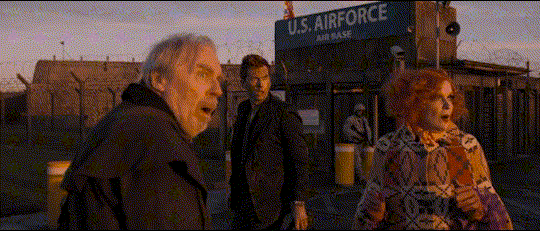
It’s true, we’ve seen him driving the car a fair amount in this season, and we saw him repairing the dents and other assorted damages following his collision with Anathema in episode 2, we even saw him giving it a pep talk as he willed it through the flames in the previous episode, but he talks about it here almost like a pet.
You were a good car.
But if I was surprised at Crowley’s response to the Bentley’s demise, I was more surprised at Aziraphale’s refusal to allow the demon to grieve purely because he still thinks of himself as “the nice one”. Well, mate, for someone who’s supposed to be inherently “nice”, you aren’t showing an awful lot of compassion here, and towards the being in the whole of existence that means the most to you too. Honestly, there are a lot of times I have been quite forgiving (no pun intended) of the angel’s behaviour because he genuinely believes in his own goodness, but I struggle with this. WHY IS HE BEING SUCH A PRICK? And who said he had to send the soldier anywhere (complete with magical miracle noise, in case you missed it), or harm him in any way? He could just have miracled the gun away, or slid him into unconsciousness like Death and Adam have already done with entire groups of soldiers. Is he just so used to Crowley doing all the footwork in situations like these that he’s lost the ability to think for himself? Or is it that him being “the nice one” is part of their agreed partnership, and that’s the role that the two of them have agreed he will play, not because that’s what he inherently is, but because that’s what makes the most sense and would usually be the most comfortable role play for them? Perhaps it really is the latter, because it’s not too long before we see Crowley make a conscious decision to resume the role that he is being expected to play.
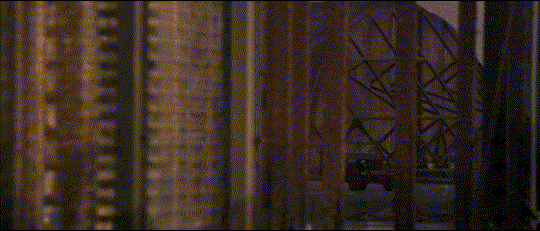
I can’t help but feel like the incoherent noises that Crowley makes are his attempt at trying to ask Aziraphale to deal with this next group of soldiers because he’s not done grieving. I should think he knows he’s pushed his luck on that front a bit too far when his bumbling is greeted with this look from Aziraphale/Madame Tracy:
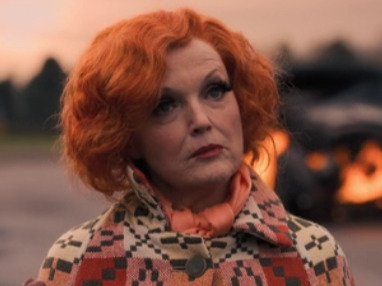
That is the face of woman/man/angel that is not to be dicked about with. And he knows it, giving himself a pep talk and asserting his position in a way that almost makes it sound like it was his idea in the first place. Almost.
Side note: there are a couple of lines missing from the original script here that I feel very sore that we didn’t get to see:
CROWLEY: Aren’t you going to introduce me to your new body? MADAME TRACY/AZIRAPHALE: Yes. Right. Madame Tracy, this is Crowley. He’s… Well, we’re sort of business associates.
Sad as I am that we didn’t get to see those lines, the tirade of double entendre from Aziraphale telling Shadwell to brandish his weapon so that they can “lick butt” almost makes up for their absence. Watching Crowley’s physical reaction because of his choice of words goes the rest of the way.
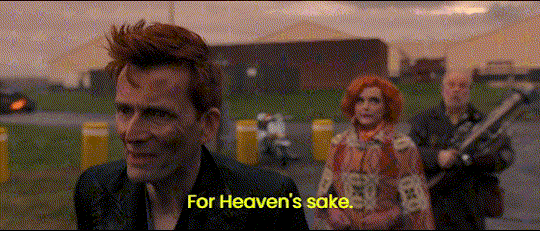
It’s interesting that he manages to use this phrase at all, even if it not only looks but sounds as if he’s about to throw up; he couldn’t even bring himself to say the word “Heaven” when he was screaming in the book shop earlier that same day.
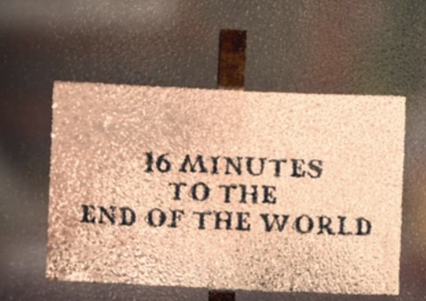
Quick note about R.P. Tyler: this really is one strange little individual. He seems to think that a child causing damage to some plants is equivalent to that same child waltzing into a highly classified military air base. Eejit.
We’re taking a quick visit to the soundscape again, inclusive of an Easter egg. I am in no way surprised at the use of a harmonica at the beginning of this scene, particularly given the stage directions provided in the script:
The feeling here is spaghetti western.
I am not of the age that I would remember the original film and scene that this is clearly an homage to (the “Man With a Harmonica” stand-off scene from Once Upon a Time in the West), but I have been to my fair share of Muse concerts (I think I’m in double figures now), listening to the “Man With a Harmonica”, to get the reference. A tribute to the original piece was also used in Pirates of the Caribbean: At World’s End, again as a backdrop for a stand-off. I have absolutely no doubt that David Arnold’s treatment of the Omens theme tune in this way was intended as both atmospheric and as a pastiche of a piece of music that is arguably the most well-known of all spaghetti Western soundtracks.
Do you remember how I waffled on about the parallels between the members of The Them and the Horsemen? Well, in case you weren’t sure about that being a thing, or maybe just hadn’t cottoned on yet, this shot should spell it out loud and clear for you:
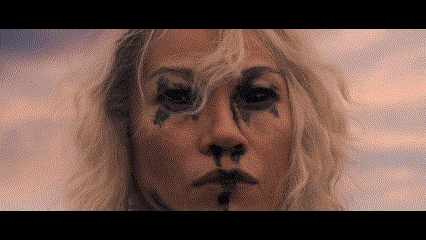
It’s interesting to see the character development that Aziraphale has gone through since his realisation that Heaven is perhaps not as “Good” as it portrays itself to be when we see him taking control of Shadwell’s gun to kill the Antichrist with, something which he has adamantly declared that he would be unable to do previously.
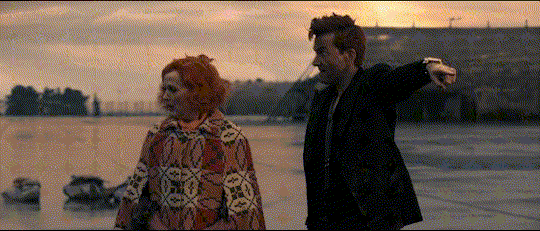
Crowley’s stance on the other hand appears not to have changed at all – he’s more than happy to support the decision to end the life of an 11-year-old boy in order to save the world, just so long as he’s not the one pulling the trigger. In fact, he not only supports that course of action, he vehemently chastises any doubts in it being the only one available to them. Madame Tracy’s interference with this particular plan of action feels to me like another statement of a recurring theme throughout the show – that the presence of free will is an inherently human quality. On this occasion, we see two non-earthly entities that both believe that there is only one course of action to be taken (i.e. there is no free will) whose actions are disrupted by a human entity who believes that this cannot be the case. What’s interesting to me is that the theoretically weaker of those entities, the human, wins out this little battle, suggesting that the actions taken as a result of free will always be victorious when pitted against actions taken through a lack of choice.
I absolutely adore watching Crowley’s expression when Aziraphale and Madame Tracy are separated. He can barely take his eyes of the angel, except when Madame Tracy announces that the separation made her feel “all tingly”.
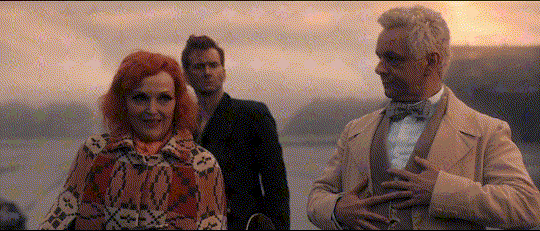
That side glance looks almost jealous to me… And what's with the little head dip with the flirty yet smitten (smited? smote?) shoulder squaring…
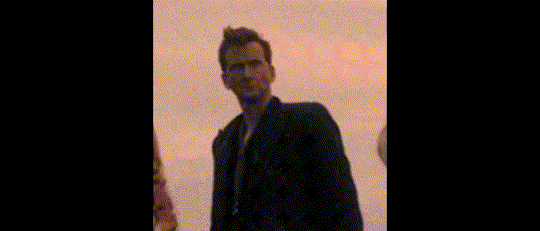
Oh, that’s right, it’s love. And probably not just a little bit of gratitude and relief that Aziraphale has been returned to him, at least for the moment. There’s even a slow blink at the very end of that clip that looks a bit like he might be trying to keep the tears away. This tiny sequence of body language cues has my heart melting every time I watch this scene, and bearing in mind that David is actually acting in the background of the shot here it speaks volumes to just what an incredible job he’s doing that I don’t watch anything in the foreground – my eyes are firmly fixed on him and his reactions. I’m pretty sad we don’t get to see the moment when Aziraphale goes to join Crowley (this assumption is based on the positioning we see in this shot and the one immediately after Newt tells Anathema he isn’t really a computer engineer) – there is a part of me that screams to see the eye contact and facial expressions involved in that whirlwind of inevitable emotions.
For a show that’s filled with dark comedy, there’s a slightly jarring sense of social delicacy in the dissolution of the Horsemen in that we don’t see any of The Them actually land a “fatal” blow. We see them take up the sword, see them holding that same sword after they impale their respective Horseman, we even see the suggestion of an impact, but we don’t see the brutal imagery of an 11-year-old child thrusting a weapon through the middle of an adult-shaped monster. The speech at the end of this episode is heavy on the subtext of the disappearance of innocence from children as they grow older, and I suspect the desire to maintain the feeling of childlike innocence in each of The Them is the reason we don’t see them committing a very violent act. We’re not only allowed to maintain that image, but it’s strengthened by Adam’s empowerment of each of them to do what needs to be done, and his assertion that the things they’re doing battle against aren’t actually people, but concepts. It makes the whole thing feel like children playing games in the woods, which I think is probably the whole point, and the reason we saw them doing so much of it earlier in the series (and especially in the book – honestly I actually got a bit bored of how much “children playing in the woods” content there was in the original text).
As a side note, and knowing that it has been pondered over by many others before me: how did Aziraphale’s flaming sword become War’s flaming sword?! I remembered to look in the FAQ list for this one, and couldn’t see that it has ever been answered.
Next side note: Dagon says that all of the legions of Hell that are readying for battle were angels before. Does that mean that every demon is a fallen angel? Because that’s a lot of fallen angels (Beelzebub says that there are 10 million of them later on in the episode).
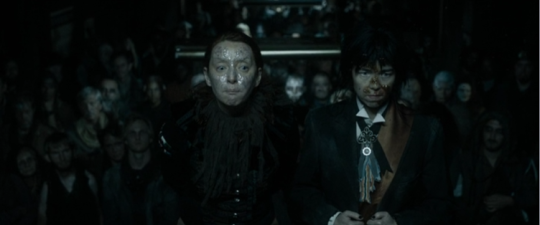
That’s also a pretty big revolution to have taken place “before the Beginning”. Surely if you were in charge of a place where half of your employees took place in an uprising, you’d have to question the validity of your leadership skills? There’s a little kudos going out to the sound editors here too – that effect of Beelzebub’s voice to make it sound like she’s buzzing like the flies she’s lord of is brilliant, mostly because it’s not there all the time, but fades in and out for maximum effect.
I also love the idea that a nuclear holocaust could all be avoided by running the disk defragmenter. It’s actually kind of appropriate, the job of the defragmenter being to rearrange important elements so that they fit together better, eliminating bad clusters as it goes, and all to ensure the hosting system can perform more smoothly. Feels like quite an appropriate analogy of a world gone mad with war.
Bearing in mind that I have been rattling on about parallels between the members of The Them and the Horsemen, there’s something interesting about Death’s parting comment to the group on the tarmac.
I AM CREATION’S SHADOW. YOU CANNOT DESTROY ME. THAT WOULD DESTROY THE WORLD.
If we’re considering that the previously mentioned pairings are mirror images of one another, would this suggest that Adam also cannot be destroyed? Or would it mean that his destruction would result in the creation of something else? Or if we took the words literally, would that make him the product of shadow (“shadow’s creation” instead of “creation’s shadow”). I like this latter idea, given who his father is (at this point anyway), but there’s something to be said for his potential for creation too, especially given his chosen name. I think there’s probably a lot to be said for possibilities for Adam’s character, which I’m planning on exploring in the future so I won’t go into this any further here.
Given the repeated suggestions we’ve seen that death = starlight (I’m paraphrasing for simplicity) in this show, and in other works by the original authors, it’s hardly surprising that Death disappears into a cluster of starts. God even tells us that, although they look like stars, they may be something else entirely, and that they reside within Death itself.
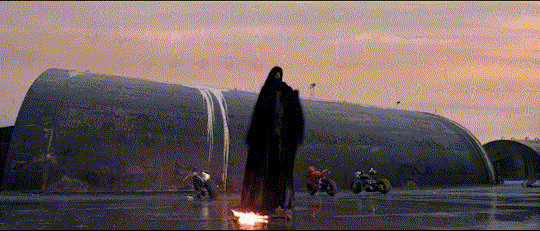
The complete dissolution of the Horsemen feels to me like a good place to stop. As always, questions, comments, discussion: always welcome. See you next time 😊
41 notes
·
View notes
Text
Aziraphale & Shostakovich's 5th
So, I did a little digging and there is a sweet and very funny Crowley connection to this symphony-- one that would make sharing it with him actually a very romantic gesture-- which is likely why Aziraphale was gazing at it fondly and so completely beyond excited to have it...
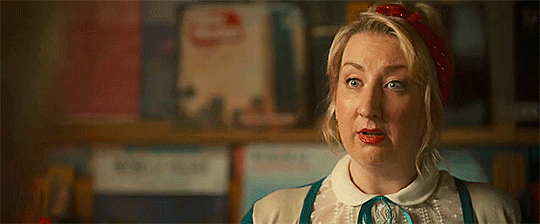
...and it also has a very Good Omens-esque history that is worth a look. Deep dive on the relevance of Shostakovich's Symphony No. 5 below. Happy anniversary, friends! 🤗💕
The first thing to know is that Shostakovich's Symphony No. 5 is one of the most analyzed and frequently performed symphonies in the world. Recordings of it are not rare by a long shot. Maggie probably has at least one other recording of this symphony in the classical music section of her shop. Aziraphale definitely already owns other recordings of it. (Especially because he knows exactly how long the first half of it is without that info being located anywhere visible on the record he's holding in the shop.) What Aziraphale is excited about is not just this symphony but *this particular performance* of this symphony because of its relevance to him and Crowley, as you'll see.
Unlike other pieces of recorded classical music that Aziraphale has in his collection, this is a record of a very historically significant live performance and it is, I'm willing to bet, one that is personally significant to Crowley and Aziraphale. It took place in a completely different era when it came to sound recording technology, as the record is a performance that was recorded live on October 20, 1959. The record that Aziraphale is so excited to receive is a digitally remastered recording of this performance. What Maggie has gotten for Aziraphale and Crowley here is, through advanced technology, some human magic. For Crowley and Aziraphale, this will be the auditory equivalent of a time travel experience.
This live performance took place at what was and still is, acoustically, one of the top places in the world for live music to be heard and recorded-- Boston's Symphony Hall-- and the equipment used to record it was state-of-the-art for its time. Obviously, though, the ability to record sound has changed dramatically since 1959. Records of this performance that were released soon after it were good by the standards of the day but were never stellar and they are really difficult to listen to by our modern standards. The recordings made then could not really fully capture the sound in a way that makes someone listening feel like they're there the way that a recording of a performance held today could.
You and I can pull up the digitally remastered sound files from this performance in under 3 seconds on our phones or computers and listen without issue to a performance with sound quality so good we will feel like we're sitting there in the music hall but for Crowley and Aziraphale? That feeling was only had on the night they were there in 1959. Records of that performance were unable to do it justice until very recently in history, when humans invented technology that could bring back the sound of that night as it truly sounded to them.
Adding to this is that humans, as a whole, despite all this advanced technology, have still not given up on a sense of the romantic so they've taken these advanced recordings and pressed them onto what is, technologically-speaking, an "outdated" form of technology-- vinyl records-- so that people who enjoy listening to music in this more old-fashioned but imminently more soulful way can have an experience that blends modern technological magic with something more intimate and personal. The result is the ability to have the romantic vinyl experience but one with the transportative quality of modern technology.
That is what is Aziraphale has had Maggie get for him and Crowley.
In 2.01, Aziraphale is so excited because he has in his hands the ability for him and Crowley to listen to a live performance of a concert from 1959-- a concert I am sure that he and Crowley were at-- and hear it sound, for the first time since, as they heard it then. Gabriel and Beez's "Everyday" records and Maggie's failed attempt at giving Nina a Nina Simone record do have a Crowley and Aziraphale parallel. We might have been distracted by the idea that, because "Everyday" is Gabriel and Beez's song, that the Crowley and Aziraphale parallel is "A Nightingale Sang in Berkeley Square" but, as you'll see, it's subtly not-- it's the other record in S2. It's Shostakovich's Symphony No. 5.
Ok, so why is Aziraphale so obsessed with this particular performance of this particular symphony and what does this have to do with Crowley?
For that, we have to look at the symphony itself.
Music is language and, within the language of classical music, composers-- particularly the sort like Shostakovich, who was limited in expression by confines of his society-- would slip bits of hidden language into their music. In his case, it was a form of rebellion against the repression of dissention by the Russian government, much in the way that Crowley and Aziraphale's hidden language-- which they speak right under the nose of Heaven & Hell-- is for them. The first movement of Shostakovich's Symphony No. 5 contains the single most Crowley & Aziraphale-ish bit of hidden language in music imaginable.
The piece of music being referenced has ties to a very famous religious parable that is Ineffable Husbands-y in the extreme.
You all have heard of Saint Anthony, yeah?
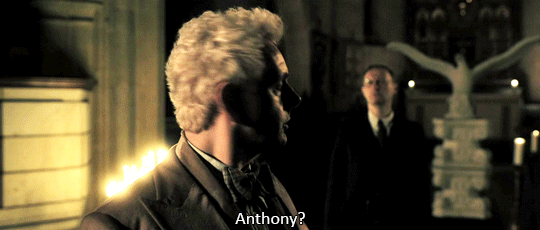
No, no that Anthony-- Saint Anthony. 😉
Patron Saint of Lost Things? The dude your grandma tells you to pray to if you misplace your car keys? The patron saint of sailors and all things nautical? And also the patron saint of pregnant people, as if Saint Anthony weren't already amusingly professional midwife Crowley-esque enough? 😂 If you know this guy, then you probably then know the most famous Saint Anthony-centric religious story, which is the one at the heart of the musical interlude that is the hidden message in Shostakovich's Symphony No. 5:
Saint Anthony's Sermon to the Fishes.
Oysters. Bouillabaisse. Gravlax in Dill Sauce. Sushi... we could go on and, indeed, I have, about Crowley and Aziraphale's ability to elevate the-sea-as-sexual-metaphor to its own art form and we all know how much they revel in blasphemy. As a result, a musical hidden message referring to Saint Anthony and his Sermon to the Fishes is possibly the funniest little romantic in-joke in a piece of music possible for Crowley and Aziraphale.
For those of you unfamiliar with this story, it goes a bit like this: the future Saint Anthony was getting a bit miffed about these heretics who weren't listening to him while he was trying to spread the word of God. He goes to his church one day and finds it empty because everyone's out doing non-God stuff. So, to make a point, he went down to the river and began to preach to the fish. (Yes, the actual fish in the river.) The story goes that the fish were all really interested in this and came up to the surface to listen to the sermon, all rapt with attention. They absorbed Saint Anthony's words and found God, leading them to then bow their little fish heads and pray hard in response.
The human people walking by? Well, their attention was naturally had as the fish were acting like people and listening to this dude preach and that was, ya know, a bit weird. The story goes then that people thought that if fish were listening to the words of Jesus as preached by Saint Anthony then maybe they should, too. The point of the parable is that Saint Anthony found a more receptive audience in the fish and, in preaching to these beings who wished to hear what he had to say, his message wound up amplified by being both received by those open to it and by drawing in others who then saw all of these engaged people listening. It suggests that the best way to speak to people and be heard is by starting with those who are already predisposed to listen and focusing on them, instead of ignoring them in favor of those whose minds are not yet open to new ideas.
(There are actual humans, though, who believed this dude really talked to actual fish, in case you needed another reminder to vote.)
As a little sidebar: there is also another story in a similarly Crowley & Aziraphale vein about Saint Anthony that is not part of the symphony in question but does relate a little bit to S2. In that story, Saint Anthony was dining with some non-believers who poisoned his food as a way of testing the fact that apostles of Christ were supposed to be immune to poison. Saint Anthony realized the food was poisoned and confronted them, found out why they did it, blessed the food, and then ate it without harm as a way of trying to prove to the non-believers that God was real.
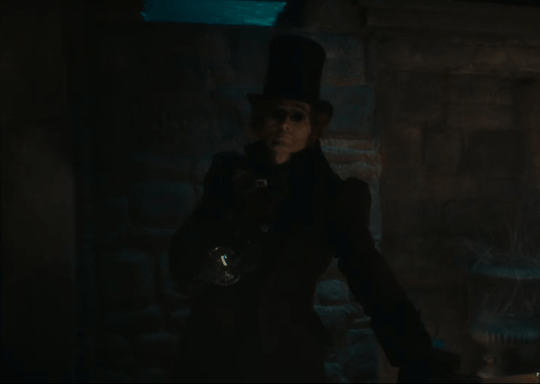
So, yeah, the Sermon to the Fishes parable here boils down to a comparison between people and fish. It's using fish as a metaphor for humanity, which Crowley and Aziraphale do in an, erm, slightly different way lol by using fish as a metaphor for their human-styled sexual relationship. To the blasphemous and fish-obsessed Aziraphale and his partner, Mr. Anthony J. Crowley, there might not be a funnier bit of Biblical humor to be had than the story of Saint Anthony's Sermon to the Fishes. So, how does this story fit into this symphony?
In the 17th century, a priest named Father Abraham a Sancta Clara wrote a poem describing Saint Anthony's Sermon to the Fishes but this priest really kinda got how insane the whole thing is because the end of it is a bit tongue-in-cheek. It is also more insightful than the actual religious story itself is because it basically says that the fish listened to Saint Anthony-- but then they went back to being their usual fish selves as soon as he was done speaking.
The humor in the poem comes from the priest using the fish as a metaphor for humans listening to the sermons of Saint Anthony and others. The priest is saying in the poem that people listening to sermons do not fundamentally change as a result because they don't take the words to heart and really apply them to how they are living. He conveys this in the poem by saying things like "the carps still stuff themselves" and-- amusingly considering the references in Demon's Guide to Angelic Beings and elsewhere to Crowley as an eel-- "the pikes remained thieves/the eels, great lovers."
If you wanted to, you could make a case that Crowley or Aziraphale influenced the poem a bit (or, even, the whole Saint Anthony story in the first place.)
Anyway, the point of the poem is... ironically... that these fish people?
They heard the words but they didn't truly listen to what was being said.
*laughs in Good Omens S2*
In tone, it's also very similar to how while Crowley and Aziraphale are overall optimistic they also are, through their experience of human history, a little jaded when it comes to the ability of someone to really enact massive amounts of change in people. The poem is in the same tone of their responses to the reasons for why Jesus was being executed for preaching kindness:
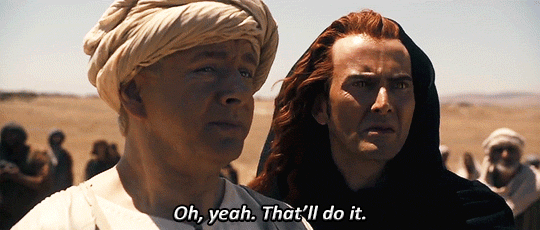
Right, so, anyway... the symphony ties...
This poem was then later set to music by the composer Gustav Mahler, with both the poem and the score included in a book called Des Knaben Wunderhorn, which was the go-to compendium of German folk songs and stories. In its inclusion here, Mahler's song-- called Des Antonius von Padua Fischpredigt (which is just German for Saint Anthony's Sermon to the Fishes)-- made the jump to what is, technically, a secular book of folk songs. In those days, there was not as much of a separation between religious music and secular music but this book is kind of a blend of both them. The song is then played all over the place and becomes an extremely popular, well-known song. Everyone then knows Mahler's tune about Saint Anthony and his fishes.
Like Crowley and Aziraphale forced to hide a bit from the regimes to which they belong and using hidden language to communicate, Shostakovich, feeling the pain of government suppression that kept him from full, open expression in his art, was forced to make sure that his compositions sounded appropriately Yay! Russia! enough to not, ya know, be killed... but he slipped in little things along the way to troll his oppressors and inform his art for those who knew to listen for hidden messages in it.
In the first movement of his Symphony No. 5, he slipped in a musical reference to Mahler's Des Antonius von Padua Fischpredigt to express his distaste for Stalin and his government.
The exact bit of Mahler's Saint Anthony's song that is musically referenced in the first movement of Shostakovich's Symphony No. 5, off of the second movement of his Symphony No. 4, is the musical accompaniment to the lyric: "He goes to the rivers and preaches to the fishes." So, in addition to the rebellious nature of this and the blasphemy, Aziraphale has bought his Anthony a symphony that begins with a musical interlude that basically says "let's get it on" in Ineffable Husbands Speak. 😉
It was only decades later, though, when people realized just how much of a fuck you this musical reference to Mahler's Saint Anthony song really was-- and that is because of the fact that Shostakovich had actually first put that very same musical reference into the companion piece to Symphony No. 5-- his suppressed Symphony No. 4.
Here's where this whole thing becomes a really Good Omens-y meta joke as well...
Shostakovich composed and completed his Symphony No. 4 during 1935 and 1936 with the intent of its first public performance being in Leningrad in December 1936. However, he and the opera he had composed that was being performed at the time-- Lady Macbeth of Mtsensk-- were targeted by Stalin. All art criticism in Russia was monitored and influenced by the state and Stalin had been growing concerned about Shostakovich getting a bit political with his art in a way that didn't benefit Stalin and his government so he fired a bit of a warning shot at Shostakovich by targeting his opera. He didn't outrightly imprison or kill him because Russia only had so many really amazing composers who could make patriotic music for Stalin lol but, at the same time, he was warning Shostakovich to toe the party line and reminding him that was always being watched.
As a result of this targeting, the public performance of Symphony No. 4 in 1936 was canceled. The symphony was not actually publicly performed at all for the next twenty-five years. It did not see the light of day until it was first played publicly by an orchestra in Moscow in December of 1961. Back in 1936, though, Shostakovich kept composing and fought against being targeted a bit by hyping his next work-- Symphony No. 5-- as being this super-patriotic ode to Russia. He somehow actually managed to get Symphony No. 5 publicly performed for the first time the very next year after Stalin was threatening him-- in 1937.
Why this matters is that the two symphonies are thematically connected and they both contain the musical motif of this reference that's relevant to Crowley & Aziraphale but musical audiences-- including Crowley & Aziraphale lol-- actually learned all of this both backwards and decades apart...
...just like how we viewers are learning the story of Good Omens.
Shostakovich composed a story between the symphonies but that story wound up presented to his audience beginning in the middle (with the start of Symphony No. 5) and with a long wait of decades before the crucial beginnings of that story (Symphony No. 4) was ever shown to the audience-- even though Symphony No. 4 had existed for a quarter of a century. It's a bit of a meta wink at how Good Omens is presenting its story out of sequence and to the fact that more of its story with Season 2 took decades to make its way into being publicly viewed.
Maybe more to the point? Audiences who heard both symphonies then took awhile to realize how interconnected they are and their understanding of Symphony No. 5-- which they've been analyzing for decades-- was changed dramatically by the revelation of Symphony No. 4 and their understanding of how the two works connect.
Since Crowley and Aziraphale lived in the eras of Shostakovich's music being revealed and first performed, these two symphonies are a classical music version of understanding a full story that took decades to be fully understood. It's kind of like their version of what Good Omens is to us.
To understand it from their point of view? Symphony No. 5 was, as we said above, first performed publicly in 1937 and the performance that Aziraphale and Crowley saw-- the significance of which we're going to talk about in a second-- took place in 1959. Symphony No. 4 was still not publicly known when they were at the performance on the record Aziraphale got from Maggie. It would be another two years after that until Symphony No. 4 debuted in 1961, even though it was written in 1936, and it would take time after that for people to begin to understand how the two pieces went together... and to really fully appreciate the fact that this canceled 4th symphony that Stalin oppressed did contain a hidden reference to Mahler's music that made it as secretly radical as Stalin had feared-- which Shostakovich then turned around and stuck right smack dab at the beginning of the first movement of his Symphony No. 5-- less than a minute into the start of it-- as a middle finger to Stalin.
Saint Anthony's Sermon to the Fishes, as we can see, has taken this longer, cultural trip to wind up being used in this symphony as a pretty delicious act of rebellion and it's pretty easy to see how Crowley and Aziraphale would be very into that. By putting the Mahler interlude again into Symphony No. 5, Shostakovich was just growling fuck all of you idiots-- you'll never stop me! beneath a socially-acceptable exterior of this symphony that managed to pass as not subversive enough and quite literally saved Shostakovich from being killed by Stalin and allowed him to keep having his work performed publicly... and he was doing so by referencing this hilariously Crowley-esque Biblical story and adding some rebellion to its social history.
That, alone, would be more than enough for why Crowley and Aziraphale love this symphony but there's actually more...
The second bit relates to why Aziraphale is so excited to have a good recording on vinyl of this particular performance of Shostakovich's Symphony No. 5. That relates to the performance's role in international relations and history, how Crowley and Aziraphale use (and the story uses) the political relationships between countries as a metaphor for Heaven & Hell, and just the really, really beautiful symbolism involved in this historic performance of this symphony.
The record that Aziraphale gets from Maggie in 2.01 is a recording of Shostakovich's Symphony No. 5 as performed-- live-- on October 20, 1959 by the New York Philharmonic, under the direction of Leonard Bernstein, at Boston's Symphony Hall. This single performance of this particular symphony happening in this way, at this time, is maybe nothing short of a miracle and is a really great example of art transcending borders and how it can bring out the common humanity in us all.
Leonard Bernstein, a first-generation American whose parents emigrated to the U.S. from what was then part of the Soviet Empire, became the first American-born composer to lead an American orchestra when he took over the New York Philharmonic. Bernstein is the composer of West Side Story and the scores for films like On the Waterfront and is known for leading the Philharmonic as a conductor to international fame as one of the world's best orchestras. Under Bernstein's direction, the New York Philharmonic made recordings of American orchestral music-- like their completely stunning version of Gershwin's Rhapsody in Blue-- that really exemplified a kind of wild, passionate, expressive feeling in the music that combined elements of jazz into classical music and has come to be globally synonymous with America.
In 1959, during the Cold War and with the Space Race in full swing, Leonard Bernstein made headlines for taking an American-government-backed, art-as-diplomacy type of trip with his orchestra to Moscow to meet his fellow composer, Dmitri Shostakovich. In a 20-day trip that is monitored by everyone under the sun lol, Bernstein and members of his orchestra are shown artistic and historically-relevant places in Moscow and get to dine and spend some time with Shostakovich and other musicians. They're all admirers of one another's work and are excited to be able to talk about music and make some together. Their countries are enemies but they are not-- they're just people aware of the politics involved of their visit but just excited to have that visit so they can talk about art with other artists they admire. While they are there, Bernstein and the New York Philharmonic perform Symphony No. 5 in Moscow for Shostakovich.
Bernstein and the New York Philharmonic play the piece a bit differently than Shostakovich and other conductors in Europe do. The main difference is playing the piece a bit faster in parts, particularly in the last movement, Movement 4 (which is the piece of the symphony that is playing in Good Omens when Gabriel arrives.)
If you listen to recordings of how Movement 4, in particular, is played by orchestras under Russian and other conductors in the decades after its first performance in 1937 in comparison to Bernstein and the New York Philharmonic's take on it, it has a very different feel to it. The change in tempo in parts changes the feeling of the piece in such a way as to basically make it emote more. It is wilder, more openly passionate and less restrained. I've seen it described as the piece shouting its own joy at being set free and that's really it.
So, the Americans played it this way in Moscow for the composer himself and in front of half the Russian government, who seem to just see it as a coup that this younger composer is coming to their country to see their composer. Bernstein is most concerned with just not offending his new friend with his take on the work-- and he is thrilled to learn that Shostakovich loves it.
Bernstein and the American government had been hoping to somehow get an exchange trip out of this but Moscow is hesitant. Rumors exist that they were worried that Shostakovich would defect so while they're fine with the Americans playing music of Russian composers, they subtly (and, probably, not so subtly) threaten Shostakovich into staying in Moscow.
Bernstein, as thanks to Shostakovich for his friendship, expresses his intent to go ahead with what they had been planning on doing if Shostakovich could come to America and that is to conduct the New York Philharmonic in a performance of Shostakovich's Symphony No. 5 in Shostakovich's honor in the very musically and politically-significant place they had wanted to bring him to to hear his work played-- Boston's Symphony Hall.
Symphony Hall in Boston is considered the finest concert hall in America from an acoustic perspective and one of the top two or three in the world. If you enjoy music performed by an orchestra, there is almost no better place in the world to music played than Symphony Hall and there is not a place of its caliber anywhere in Russia. For a composer like Shostakovich, secretly long-suffering at the hands of the Russian government, it would have been one of the highlights of his life to hear his own music performed in this wild and free way by his American friends in what is basically the classical music equivalent of paradise and that, as a bonus, just so happens to be located dead center in the birthplace of the American Revolution.
Bernstein had hopes that they could convince Moscow to let Shostakovich come to Boston to hear his music performed at Symphony Hall but Moscow won't budge so Bernstein gets an idea that both governments also like because it winds up good press for both for them-- the New York Philharmonic is going to perform Shostakovich's Symphony No. 5 in Boston's Symphony Hall in honor of their time in Moscow with Shostakovich and they will make a record out of it, which the record labels love because the attention paid to the trip means the record will sell tons of copies. The musicians are all really also doing it, though, to make a record of the performance out of love for Shostakovich himself, so he can have the closest thing possible to hearing his symphony performed in Symphony Hall.
So, naturally, when this concert took place? The musicians were all really emotional and played the living fuck out of this symphony as a love letter to their friend trapped behind the Iron Curtain. There are many people who consider it to be the best performance of Shostakovich's Symphony No. 5 in existence.
It's October 1959-- there is no internet. No one can get Shostakovich a VPN and link to a livestream. He had to wait months for the record to be pressed and to get a physical copy on record through international mail before he could hear it. When he did, the sound quality was the best 1959 had to offer but it still was nothing like what the digitally remastered version of this live performance that Aziraphale has on this record is like.
Even though he was not able to hear this performance in person, Shostakovich did receive the record in 1959 and was able to hear with the best sound of that time what his music sounded like in Symphony Hall when performed by a bunch of Americans going wild out love for him and his work and giving what some consider one of the best orchestral performances ever in the process, in a place that is, acoustically, musical Heaven. Shostakovich died in 1975. Sound had barely improved by then by comparison to today. He never actually got to hear this Symphony Hall performance the way that Crowley and Aziraphale did in 1959 and can now again by listening to the record Aziraphale has just bought from Maggie.
Aziraphale's love of classical music, plus his financial and magical resources and having plenty of time to travel mean to me that he has undoubtedly heard music live in Boston's Symphony Hall before. Because of how much of an international and cultural event this particular performance was in 1959, it was hyped for weeks before it happened. It was almost impossible to get seats but Aziraphale is very wealthy and very magical. Given how much he loves classical music and the really moving story of this performance, Aziraphale, if he didn't already have an in from knowing different composers (probably Bernstein heh), he would have gone so far as to give away a book to get to this thing. He and Crowley were at this concert.
Given how much the story of this concert parallels he and Crowley and their love across enemy lines, this would be worth the risk. They definitely would have had no trouble being inconspicuous and blending in amongst the crowds here as this concert was very sold out. They snuck off to America together for a date to watch its best musicians play a passionate ode to the subtly subversive music of their fellow artist with whom they couldn't always physically be because of who he was forced to work for but whom they love madly anyway.
The hidden language, the hilarious blasphemy of St. Anthony and his fish, the way they use Russia and America as a parallel, the absolutely beautiful music itself and all the parallels to their relationship in this particular, live performance and how it came to be, and the fact that he and Crowley were there together... It all makes this record different from other ones Aziraphale is shown to have or has listened to in the past.
He loves those, too, and they probably have significant meaning to him but the Schubert he was listening to in 1.01, for example, is not a live performance. A lot of classical music recordings are edited. It's music played by others that is like music Aziraphale once heard live. This is a literal record for Aziraphale, in the sense that it's a live concert and he and Crowley were there.
Think, for a moment, about how special that really is to Aziraphale and how much it will be to Crowley when he finally finds out Aziraphale has this record...
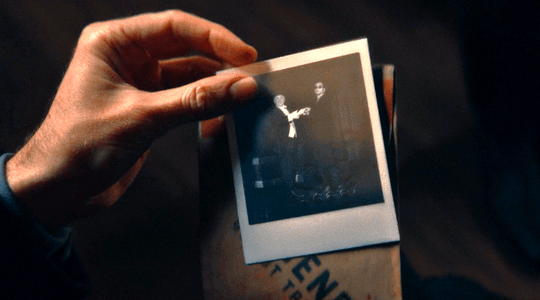
They have souvenirs but nothing that is overt and nothing that is any sort of audio/visual record of any time they've ever spent together. They either destroyed or have deeply hidden the one picture of the two of them together that they had. Everyone else in the modern world is walking around snapping photos and making videos left and right of the people they love but Crowley and Aziraphale are not. They don't have pictures of each other or videos or a recording of each other's voices. It's too dangerous. They've been sneaking out for dates for literal ages and they don't have a single record of what any of those countless nights sounded like.
Aziraphale is vibrating with excitement over this record in 2.01 because he is thinking that, when Crowley comes back later in the day, he'll be able to give him this record of the music from this very memorable night they once had together in 1959. Aziraphale knows this is romantic as all holy hell and that Crowley is going to love this so he can't wait for later that night when he and Crowley can listen to this album together. Aziraphale knows he has a very amorous evening in store as that demon is going to be mush over this record.
I think that's actually the joke as to why he's listening to the album backwards.
As others have pointed out, it's the first half of the symphony-- its first two movements-- that are just over 21 minutes long and one might assume that someone would begin listening to the record of the symphony with Side A of the record. This is what Aziraphale seems to tell Maggie that he's going to do when he makes the hilariously lewd little "21 minutes" comment. However, when we actually see him in the bookshop after just a few minutes have passed, it's clear that he actually put Side B on the record first and began in the middle of the symphony with Movement 3, as the record is playing the very beginning of its ending-- Movement 4-- when Gabriel arrives. There's an etymology joke that explains this a bit.
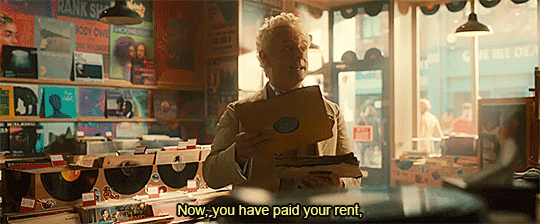
Aziraphale is obviously thinking about Crowley while being excited to get this record and about the hidden language within it and his and Crowley's own hidden language. Both of them actually frequently phrase sentences to other people around them that sound normal to those people but actually mean something slightly different if the words they say are viewed through a filter of the rules of their vocabulary. Crowley will say things to Maggie in their speak in 2.06 when he's irritated over the fact that she says they don't talk and Aziraphale is doing so with the "21 minutes" comment. The key word in the sentence that actually changes the meaning of it is the word next.
Next, from the Proto-Germanic nekh, meaning near, and nigh, meaning near and soon.
In other words, Aziraphale's comment sounds like he's, ah, really excited about his music and is about to go, ah, really enjoy the first side of this album but, while he is rather excited to have the record, the 21 minutes of the first side of it are not something he's going to be listening to in the next 21 minutes-- meaning, the exact following 21 minutes-- but that he will be listening to in the next 21 minutes with next in its etymological root meaning of soon.
He's saving the first half of the symphony and its Saint Anthony's Sermon to the Fishes for Anthony.
This actually though winds up making the lewdness of Aziraphale's "21 minutes" comment even funnier when you take into account the musical natures of the different movements of this symphony. While everyone's taste is different, I feel like it's a safe bet that if all of you go listen to this symphony in full right now, you will agree with me that the only truly fuckable-music part of it is Movement 3-- which is very much so.
The joke winds up being more like Aziraphale is listening to the second half of the symphony on the B side of the record alone when we first see him because he really loves the damn symphony itself and wants to hear all of it right away to appreciate the performance of the music in its own right but he knows that he and Crowley are going to be getting busy from the hot Movement 3 on and he will not be able to pay attention to the music so he's sneaking a listen to Side B of the record first just to have the musically orgasmic experience as well. 😂
It also adds a funny element to Gabriel's arrival. Movement 4 of the piece is wild and soaring and then winds up in this weird kind of funeral march-- these two and their sex and death-- and Aziraphale's just trying to appreciate the piece when a naked, American-presenting bit of celestial harmonies shows up on his doorstep, bear hugs this Shostakovich, and defects to his and Crowley's embassy.
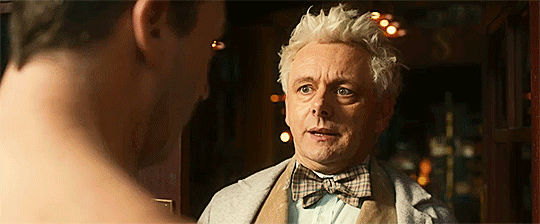
Gabriel's arrival causes a chain of events that culminate in Aziraphale still not having shown Crowley this record and, as Gabriel is in the street, arriving in 2.01, he is being recorded with ease by hundreds of people on cell phones-- all of them easily making high-quality records of an event with technology that is nothing shy of magic that now exists in everyone's pockets-- Aziraphale is inside listening to a record on vinyl that was made during this same modern era, using its advanced technology to act as an accurate recording of a concert from the past that would have been lost to it without the magic of the humans and their technology.
It continues the theme of different kinds of records-- Muriel the Scrivener, books and diaries, Maggie's record shop, "Everyday", the Gabriel file in Heaven, the Satanic nuns and their lots of records that were lost in the fire, etc.-- and underscores the themes of memories and existence.
Ok, a couple of more things about this record here that tie to the story. We should probably note that the Movement 4 that Aziraphale is listening to when Gabriel arrives is labeled allegro non troppo, which means fast, but not overly so. Not only does it describe both the original intent of the music and still works with Bernstein's interpretation of it but when you consider the pacing aspect of Crowley & Aziraphale's story with the car and around that particular word of fast (which also means to withdraw from eating for a period of time), it adds in the music motif to some of that as well.
Also about the final movement: not within the part we hear in the show but within Movement 4 as a whole, Shostakovich references a song he wrote separately from this symphony that was musical accompaniment for a poem by Russian poet Alexander Pushkin called Rebirth. It is worth a read as there might be some threads to pull on there when it comes to where Aziraphale ends up over the course of the season and in general.
Another thing is that the first movements of the symphony have been described as a kind of mix of lamentation and grief with a sense of pining and longing to them, which I got when I listened as well. There is a lot of angst in it and musical motifs that kind of go nowhere at times, representing a lot of anxiety and unfinished threads. Some attribute this to the fact that Shostakovich had a tragic romantic life and, around this time, a woman with whom he was madly in love refused his marriage proposal, fled to Spain and married a film director there.
Shostakovich also included something else of Crowley and Aziraphale relevance in the first movement, possibly off of that failed romance of his-- so, alongside the reference to Saint Anthony's Sermon to the Fishes. It is a musical reference to the Habanera, the famous aria from Bizet's Carmen.
While lusty and playful, lyrically, the Habanera is also a bit of a pine fest about not knowing when or if you'll ever get to be with the one you love but about how that love is wild and untameable and cannot be stopped.
Its formal name is its first lyric, which is:
L'amour est un oiseau rebelle, which is French for...
Love is a rebellious bird.
youtube
147 notes
·
View notes
Text
Aziraphale’s Choice, the Job Connection, and Michael Sheen’s Morality
Update: Michael Sheen liked this post on Twitter, so I'm fairly certain there is a lot of validity to it.
I’ve had time to process Aziraphale’s choice at the end of Season 2. And I think only blaming the religious trauma misses something important in Aziraphale’s character. I think what happened was also Aziraphale’s own conscious choice––as a growth from his trauma, in fact. Hear me out.
Since November 2022 I’ve been haunted by something Michael Sheen said at the MCM London Comic Con. At the Q&A, someone asked him about which fantasy creature he enjoyed playing most and Michael (bless him, truly) veered on a tangent about angels and goodness and how, specifically,
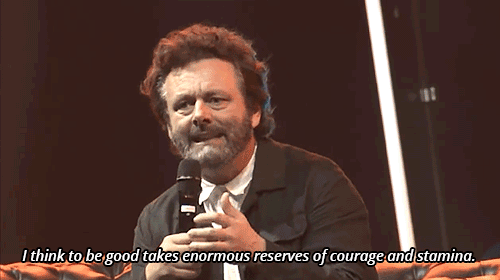
We as a society tend to sort of undervalue goodness. It’s sort of seen as sort of somehow weak and a bit nimby and “oh it’s nice.” And I think to be good takes enormous reserves of courage and stamina. I mean, you have to look the dark in the face to be truly good and to be truly of the light…. The idea that goodness is somehow lesser and less interesting and not as kind of muscular and as passionate and as fierce as evil somehow and darkness, I think is nonsense. The idea of being able to portray an angel, a being of love. I love seeing the things people have put online about angels being ferocious creatures, and I love that. I think that’s a really good representation of what goodness can be, what it should be, I suppose.
I was looking forward to BAMF!Aziraphale all season long, and I think that’s what we got in the end. Remember Neil said that the Job minisode was important for Aziraphale’s story. Remember how Aziraphale sat on that rock and reconciled to himself that he MUST go to Hell, because he lied and thwarted the will of God. He believed that––truly, honestly, with the faith of a child, but the bravery of a soldier.
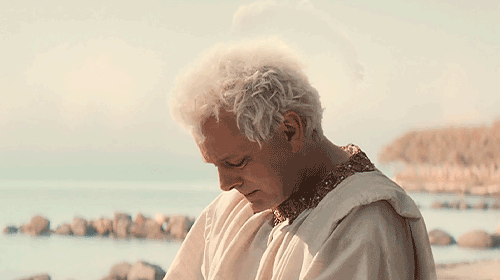
Aziraphale, a being of love with more goodness than all of Heaven combined, believed he needed to walk through the Gates of Hell because it was the Right Thing to do. (Like Job, he didn’t understand his sin but believed he needed to sacrifice his happiness to do the Right Thing.)
That’s why we saw Aziraphale as a soldier this season: the bookshop battle, the halo. But yes, the ending as well.
Because Aziraphale never wanted to go to Heaven, and he never wanted to go there without Crowley.
But it was Crowley who taught him that he could, even SHOULD, act when his moral heart told him something was wrong. While Crowley was willing to run away and let the world burn, it was Aziraphale (in that bandstand at the end of the world) who stood his ground and said No. We can make a difference. We can save everyone.

And Aziraphale knew he could not give up the ace up his sleeve (his position as an angel) to talk to God and make them see the truth in his heart.
I was messed up by Ineffable Bureaucracy (Boxfly) getting their happy ending when our Ineffable Husbands didn’t, but I see now that them running away served to prove something to Aziraphale. (And I am fully convinced that Gabriel and Beelzebub saw the example of the Ineffables at the Not-pocalypse and took inspiration from them for choosing to ditch their respective sides)
But my point is that Aziraphale saw them, and in some ways, they looked like him and Crowley. And he saw how Gabriel, the biggest bully in Heaven, was also like him in a way (a being capable of love) and also just a child when he wasn’t influenced by the poison of Heaven. Muriel, too, wasn’t a bad person. The Metatron also seemed to have grown more flexible with his morality (from Aziraphale's perspective). Like Earth, Heaven was shades of (light?) gray.
Aziraphale is too good an angel not to believe in hope. Or forgiveness (something he’s very good at it).
Aziraphale has been scarred by Heaven all his life. But with the cracks in Heaven’s armor (cracks he and Crowley helped create), Aziraphale is seeing something else. A chance to change them. They did terrible things to him, but he is better than them, and because of Crowley, he feels ready to face them.
(Will it work? Can Heaven change, institutionally? Probably not, but I can't blame Aziraphale for trying.)
At the cafe, the Metatron said something big was coming in the Great Plan. Aziraphale knows how trapped he had felt when he didn’t have God’s ear the first time something huge happened in the Big Plan. He can’t take a chance again to risk the world by not having a foot in the door of Heaven. That’s why we saw individual human deaths (or the threat of death) so much more this season: Elspeth, Wee Morag, Job’s children, the 1940s magician. Aziraphale almost killed a child when he couldn’t get through to God, and he’s not going through that again.
“We could make a difference.” We could save everyone.

Remember what Michael Sheen said about courage and doing good––and having to “look the dark in the face to be truly good.” That’s what happened when Aziraphale was willing to go to Hell for his actions. That’s what happened when he decided he had to go to Heaven, where he had been abused and belittled and made to feel small. He decided to willingly go into the Lion’s Den, to face his abusers and his anxiety, to make them better so that they would not try to destroy the world again.
Him, just one angel. He needed Crowley to be there with him, to help him be brave, to ask the questions that Heaven needed to hear, to tell them God was wrong. Crowley is the inspiration that drives Aziraphale’s change, Crowley is the engine that fuels Aziraphale’s courage.
But then Crowley tells him that going to Heaven is stupid. That they don’t need Heaven. And he’s right. Aziraphale knows he’s right.
Aziraphale doesn’t need Heaven; Heaven needs him. They just don’t know how much they need him, or how much humanity needs him there, too. (If everyone who ran for office was corrupt, how can the system change?)
Terry Pratchett (in the Discworld book, Small Gods) is scathing of God, organized religion, and the corrupt people religion empowers, but he is sympathetic to the individual who has real, pure faith and a good heart. In fact, the everyman protagonist of Small Gods is a better person than the god he serves, and in the end, he ends up changing the church to be better, more open-minded, and more humanist than god could ever do alone.
Aziraphale is willing to go to the darkest places to do the Right Thing, and Heaven is no exception. When Crowley says that Heaven is toxic, that’s exactly why Aziraphale knows he needs to go there. “You’re exactly is different from my exactly.”
____
In the aftermath of Trump's election in the US, Brexit happened in 2018. Michael Sheen felt compelled to figure out what was going on in his country after this shock. But he was living in Los Angeles with Sarah Silverman at the time, and she also wanted to become more politically active in the US.
Sheen: “I felt a responsibility to do something, but it [meant] coming back [to Britain] – which was difficult for us, because we were very important to each other. But we both acknowledge that each of us had to do what we needed to do.” In the end, they split up and Michael moved back to the UK.
Sometimes doing the Right Thing means sacrificing your own happiness. Sometimes it means going to Hell. Sometimes it means going to Heaven. Sometimes it means losing a relationship.
And that’s why what happened in the end was so difficult for Aziraphale. Because he loves Crowley desperately. He wants to be together. He wanted that kiss for thousands of years. He knows that taking command of Heaven means they would never again have to bow to the demands of a God they couldn’t understand, or run from a Hell who still came after them. They could change the rules of the game.
And he’s still going to do that. But it hurts him that he has to do that alone.
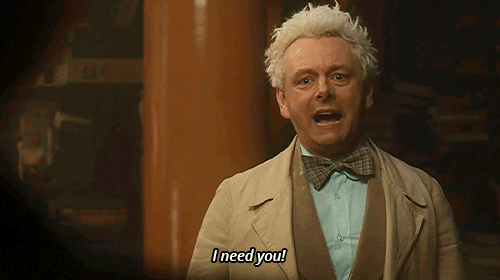
11K notes
·
View notes
Text
The Ineffable Detective Agency Presents: What Happened in Before the Beginning?
Hello Good Omens clue hunters and detectives! I’m super excited to share what we’ve discovered in Before the Beginning. Read on if you want to see what no one else has spotted yet!
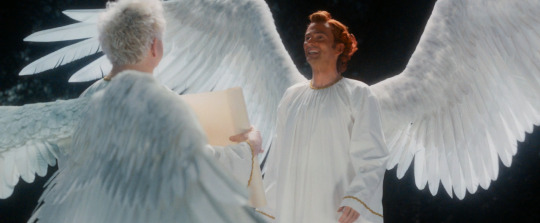
To put a long story short, something is “up” about Good Omens - Season 2 in particular. While the eagle-eyed have documented a number of odd things in Season 2 already (summarised here), I’ve never seen anyone call into question what was presented during the Before the Beginning scene. Let’s take a closer look shall we?
Remember this scroll to start the nebula? Well, guess what - it changes!
Here’s the first scroll we see on screen, I’m going to call this the “new” scroll. Note the straight edges and completely pristine look, like brand new paper:
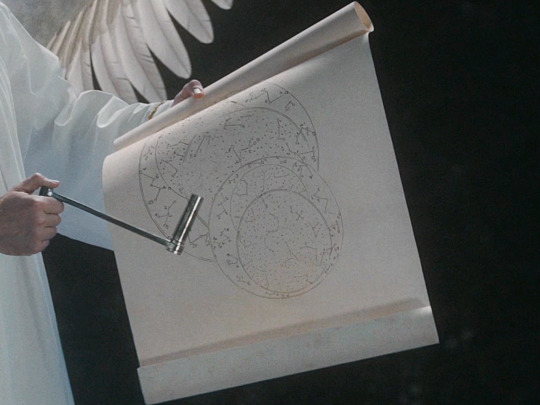
Then suddenly, here’s what it looks like as they start up the nebula:
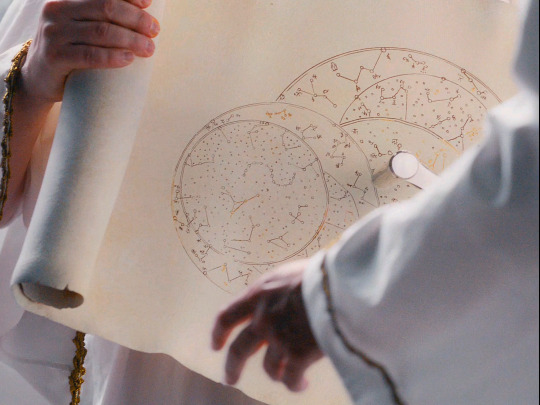
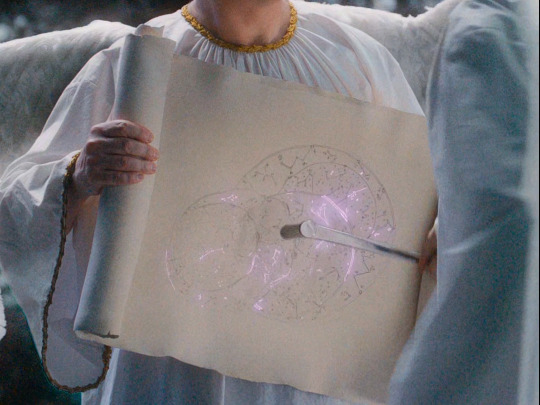
Whoa, that’s looking pretty old and ragged! It’s got rips, a bit of discolouration, several wavy bends running through it. That’s a significantly more worn scroll than we were just shown. Let’s show that in close up just to be sure:


Yup, that’s certainly not meant to be the same scroll!
During this scene, the old scroll is seen again during the close up of Aziraphale holding it. However, once Crowley instructs him to put it down, it’s the new scroll again. (And then at this point it disappears into hammerspace like in a cartoon, or drifts off into space, never to be seen again).
So... there's TWO scrolls?
Well, yes, but also, no. If you're wondering, “Are they both real scrolls? Are you telling me they had two on set?” the short answer is no, this was done with VFX. To explain why we know this, I’m going to hand over to our resident Art Director, @noneorother:
Hi all, @noneorother here. Sure. So it's mostly to do with the shadow inside the scroll curls and under the right hand side curl. You can see when it's the real scroll that the shadows are all orange or brown, because of sub-surface scattering:
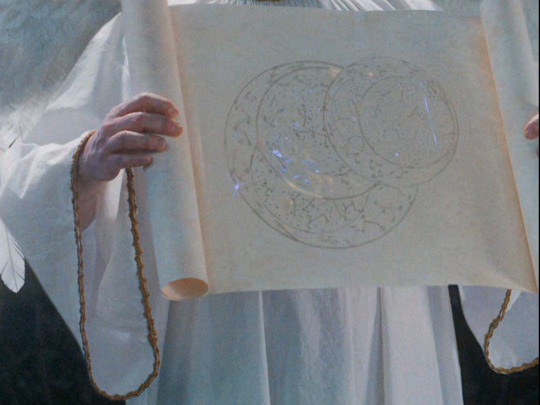
It happens when light partially passes through a thin porous object like skin or paper. So when the scroll is new, it's real. Where they've added "scroll is old now" VFX on top of the shots, it's very well tracked, but there's no more sub-surface scattering because it's VFX, not filmed. So the shadows are now base-black inside the curl and to the right hand side of the image. This is the VFX scroll here:
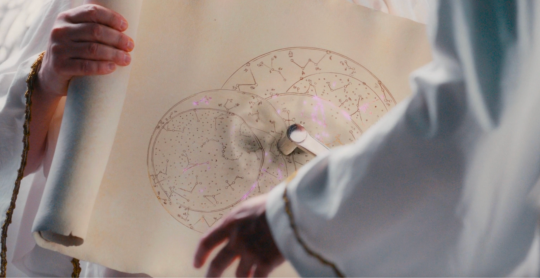
They already perfectly tracked the astronomy animation into the center of the scroll, so they had all that tracking info just sitting around. It wouldn't have been very expensive to add the "old scroll" the way they did it (the cheap and dirty way).
Thanks @noneorother! So there we have it folks, the Good Omens team have intentionally designed some shots with the old-looking VFX scroll and some without. They had the assets created for the old scroll and the tracking to place it correctly, so how could they possibly make the “mistake” of adding it sometimes but not others? This wasn’t a budget thing. If it were budget related, they wouldn’t have created the old scroll VFX in the first place.
Personally, I think this discontinuity was to tell us, the dedicated rewatchers, that what we initially saw in S2 was not the whole story. There is something else at play during S2. Something that, depending on what we find, may make S3 even more enjoyable.
So, why do this? Is this scene being conveyed from different perspectives? Are we viewing different characters’ memories of the same event? If so, why would that be important? Is someone tampering with past events? Did “Before the Beginning” happen multiple times and we’ve seen a spliced together version? What do you think?
One More Question...
The other question worth asking here (which Aziraphale helpfully asks for us) is “which way up” does the scroll go? Look closely at the central rings.
Is it the top version (small rings to the right)?

Or the lower version (small rings to the left)?

... and what happens if you create a nebula upside down, I wonder? Here I’m reminded of the Nightingale Sang in Berkeley Square lyrics:
The moon that lingered over London Town Poor puzzled moon, he wore a frown How could he know we two were so in love The whole darn world seemed upside down
In a season where something is going "Down in the Up", and the answer to Gabriel’s mystery is achieved by turning the delivery box upside down, this is yet another up-down reversal we can add to the list!
..................................................................................
If you’ve been following our Good Omens posts up until now, you’ll be aware that this is not the only time scenes have been inconsistent or discontinuous. If this is new to you, please check out my summary post on Season 2 discontinuity here. For more of our posts, plus a collection of Clues and metas from all over the fandom, see here.
However, there is still more to come, so watch out for future updates. If you’re not currently puzzling over Good Omens and would like to join in, please do! We’d love to hear what you find - you can use the tag #ineffable mystery.
Special thanks to @noneorother, @embracing-the-ineffable, and to all the other lovely people at @ineffable-detective-agency (@theastrophysicistnextdoor, @ghstptats, @somehow-a-human, @lookingatacupoftea, @dunkthebiscuit @havemyheartaziraphale, @komorezuki, @251-dmr, @maufungi).
209 notes
·
View notes
Text
Good Omens S2 Transcripts
Been working on these for a few weeks now, and they're finally done!
I really missed having the Script Book to refer to, especially when writing fic, so I made the next best thing, which is some transcripts (+minor descriptions)
PDFs:
EPISODE ONE
EPISODE TWO
EPISODE THREE
EPISODE FOUR
EPISODE FIVE
EPISODE SIX
UPDATE: Google docs links below:
Episode One
Episode Two
Episode Three
Episode Four
Episode Five
Episode Six
2K notes
·
View notes
Text
About what's going on with Neil
This is going to be a little longwinded, but I'm a writer, so you should expect that. Try to read through all of it before you for opinions. You need a whole picture to do that — in fact, that's the point of what I have to say.
I have seen this one article at the moment. Just this one so far. I don't trust the media, I can't trust the media (can anyone these days?); so as much as I would love to either be able to support one side or the other and have closure on the matter, I cant. And that's okay.
(Yes, it actually is)
I know you can't judge people by their internet presence or by their works so I'm not going to pretend that's enough to form a valid positive opinion of Neil, but I do need more than one valid source before I upheave my personal feelings. And it won't cause me to uproot myself from my fandom.
I'm writing this because I'd like everyone to do the same, if you can. Take a breath. Let things become clearer before you form an opinion of either side of the situation.
For the Good Omens fandom specifically, keep doing what you do. From what I've seen we have a generally wholesome fandom, and I don't think this news has any bearing on any of us, or anything we do. We can keep being creative. We can keep loving the story and it's characters. We can keep going.
Please don't fall apart. Take care of yourselves and be kind to each other. That's all.
2K notes
·
View notes
Note
Hello dear Mr Gaiman.
a few minutes ago I read a thread of how a succession of unexpected events Butterfly effect style led to Michael Sheen as our favorite angel / librarian. So I start to think about what specific event led you to write this great work together with Mr Terry Pratchett. Maybe a burned out lightbulb in your study that made you rethink the little miracles of science and how an old witch could have predicted it?
PS: thank you very much for all your work. the world needs more series like goos ommens mr Gaiman ... it really needs them.
Hmm.
Well, in 1985 (I think) I spent 3 weeks doing a real job. I was the editor of Fitness Magazine between the leaving of an editor and the arrival of an editor. It was my job to write everything that the magazine needed that hadn't been written, and to organize all the things that had already been commissioned. (I was given the job because I'd been filling in for the assistant editor on a magazine at the next desk.) When the new editor turned up she was vaguely grateful and offered to buy anything I wrote for the magazine. Given that I had barely any interest in fitness at the best of times (although, in retrospect, I was probably at my fittest, not being able to afford a car or taxis, and walking and bussing everywhere in London) I wrote an article taking a whole load of literary works, including Winnie the Pooh and Lord of the Rings, and writing a short bit in their style about their fitness regimen. And one of them was Richmal Crompton's Just William character. The editor rejected the article suspecting (quite rightly) that the people who bought Fitness Magazine might feel the humour was aimed at them. And I never even tried to sell it to anyone else (who would I have sold it to?). But I remembered the pleasure of writing William fiction.
And then, the following year, I watched The Omen on late night TV. "Be funny if they got the baby swap wrong," I thought. "If the baby that the powers of Hell were keeping tabs on was a perfectly normal kid. And the Antichrist were growing up somewhere nice like the village in the William books..."
And that started to grow in my head. Then I was reading The Jew of Malta by Kit Marlowe, and it has a bit where the three (cartoonishly evil) Jews compare notes on all the well-poisoning and suchlike they'd done that day, and as a Jew who never quite gets his act together, it occurred to me that if I were the third Jew I'd just be apologizing for having failed to poison a well...
And suddenly I had the opening of a book. It would be called William the Antichrist. And it would begin with three Demons in a graveyard...
I wrote the first 5000 words, sent them to a few friends, and then Sandman was commissioned and I figured I'd get back to it One Day until Terry Pratchett called and said "Here. That thing you sent me. Are you doing anything with it? I think I know what happens next. I could buy it off you or we could write it together."
5K notes
·
View notes
Note
What will happen in season 3 of Good Omens? What are your predictions? Does your crystal ball glow blue or red?
- south downs retirement ending (non-human)
- pieta moment
- crowley’s fall backstory
- 1941 part 3 (+ apology dance)
- makeup kiss
- blue
79 notes
·
View notes